#it has to be a pretty tangible event or action of one person
Explore tagged Tumblr posts
Text

the obey me franchise as we know it is ending.
i'm sure if you're following this blog that you have seen the announcement from the devs on the official obey me account. they announced that december of 2024 will bring the last batch of game content for the og obey me and obey me nightbringer apps. they're very clear that the lore of obey me will continue into other projects, and that the characters will return. please read the official statement if you have not already.
i don't anticipate anyone has been waiting to hear my opinion on the matter. but the announcement has had me thinking. i want to update you all both on my feelings about the in-game story ending and my future plans for obey me works on this blog. there's one particular takeaway that keeps coming to mind with all of this.
there is nothing wrong with enjoying romance, or with loving otome games.
i think i noticed my interest dwindling in obey me nightbringer going into season 2. there was this storyline about the brothers being summoned to return to heaven or face the threat of a war between the celestial realm and the devildom, and the drama around the plot felt very tangible and heavy with emotions. i was so sure season 2 was going to reflect these stakes. and then it just... didn't. season 2 didn't seem to care much about the previous season at all. i fell behind in playing, but i kept up with summaries made by my peers. i had every intention to catch up once the game drew me back in.
but it just... didn't.
i think nightbringer's storyline is pretty lackluster. i'm not going to claim that og was some stroke of brilliance, but the writing was pretty interesting. actions had consequences. the stakes felt important. and that's not nostalgia talking, either-- i got into this game way later than some of my peers. this blog just celebrated its two year anniversary earlier this month, and at that time i hadn't even heard of the game. i just... there was something special about og. and there was something special about the first ten lessons of nightbringer, too. it felt like there was real care put into the story, into establishing a semi-coherent line of lore between plot threads. i don't believe that care is here anymore. it hasn't been for awhile. the events are bad. the main story is bad. character complexities have been flattened down into quippy one-liners and boring texts. asmo is shallow. satan likes cats. beel is hungry. these characters i once raced to consume content for in order to analyze each dimension of their personality have all been made boring and repetitive to fit into a boring and repetitive plot.
there's also a point to be made about the age rating and clear shift in audience changing from og to nightbringer. jesus. that shit was so painful and probably contributed to why nightbringer felt so juvenile at times. i am not a child. i am not particularly interested in my romance games being targeted towards kids. i'm also not all that interested in my romance games being ashamed of romance games, aka the clear conclusion nightbringer has led me to believe. the severe lack of romance in the later seasons of the franchise was utterly painful, like the game was pulling a switcheroo on the fans as to what the game would be about. where raunchy jokes and suggestive scenes would be now feels hollow-- each kiss from the characters feels like a chaste way to placate the audience into not protesting the complete and utter lack of intimate connection with the characters. not every game has to be smut, obviously, and i'm not saying i'm mad at obey me for not being straight-up pornographic. but for fucks sake-- season 2 of og opened with an aphrodesiac plotline. clearly, the writers have had no problem with coy, fade-to-black suggestiveness before. the exclusion of romance is such a detriment to nightbringer, and shows a clear lack of interest from the devs in continuing to write the romance game they promised.
basically, i'm not a fan of nightbringer. i think the story of obey me is cooked so far. it's hard not to feel a bit betrayed, either. i understand companies have to make money, and obviously choosing more profitable forms of media or audiences is a choice companies will make, but... i don't know. it feels like solmare wants to transition away from romance when most of us are explicitly here for it. what audience is left when you abandon both your genre and original format? i don't want to the story to continue in a manga or anime. that defeats the purpose of the gn!mc they created, as well as the whole damn plot revolving around the player character. if that's where the franchise's future lies, well, then... i guess i'm not going to be keeping up with it in the future.
do not misunderstand me-- i have lots of love for the obey me games. i structured this damn blog around them. i wrote fanfiction and made community and supported these games financially. but i have a right to my own interests. i started playing obey me because it was an otome game. the main drawing points were the accessibility of the format (mobile game) and the romance. lots of people are disappointed, as am i. the devs (and other fans) can scream and shout from the rooftops that "obey me isn't over", and technically, they're right, but what is obey me anymore? is it the characters they've flattened for marketability? the lore they've retconned and destroyed? the games they're no longer continuing?
to be clear, all of this is speculation. i may eat my words next year when they come out with "obey me 3: mc's return" or whatever the hell they have in store. but i'm not really interested if it's not a well-written, interesting game centered around a solid plot, familiar characters, and romance. solmare has a lot to prove should they want to capture my interest again for future projects.
as for the future of obey me on this blog? for starters, i will not be mass deleting any of my works. i personally detest when people do this, and i will not be contributing to this phenomena.
going forward, i will, predictably, branch out into other games. i've been really into love & deepspace and ikemen villians recently. both of those games have very interesting plotlines. i feel revitalized playing them-- they feel like a lover letter to the genre, giving the same level of interest and care that fans do into keeping the game running. so expect those sorts of games to end up here. i also have a separate twisted wonderland blog, as that game, even though it's not romance, is still full of wonderful characters and a very interesting storyline that i adore. but obey me has a spot in my heart forever, and i will continue to write about it. i still have many ideas, ocs to introduce, series to make, aus to explore... despite the games' story ending, the stories here will live on.
i am warning you now, though, that i will be taking many creative liberties with the lore. and if new content comes out that i'm not keeping up with, and it somehow contradicts my works... well, tough shit. solmare can kiss my ass. you will have to pry these characters out of my cold, dead, rotting hands before you can have them back.
to summarize: the obey me games are finishing the story by the end of this year. i will probably not keep up with the lore should it continue in a serious capacity in forms like manga, anime, live shows, etc. i am interested in writing more within the universe, but i will be tweaking lore as i see fit to undo the damage solmare has done recently. this blog is going to expand more into other games as well. none of my fics will be deleted en masse due to this announcement. the voice actors and people who poured all their love into these games have my affection, but solmare is on my shitlist forever probably.
72 notes
·
View notes
Text

World Seed SRD (WSRD) is intentionally built to be a pot you can throw a setting into, or reforge slightly so you can make any dish you want. And I'm working on the JJK setting right now, so we only care about pre-building the fantastic elements of the setting into World Seed, and the Jujutsu Kaisen universe only has 1
Cursed Energy
A pretty elegant addition to a world's laws, in my opinion. An aspect of reality that responds directly to the emotions of sapient and sentient creatures, capable of even giving birth to life itself. However malicious that life may be. Everything fantastic within the world Akutami-san has created, seems to flow from that, and these facts:
Cursed energy both comes from and responds to brain waves that correspond to negative human emotions.
It can be spent, no differently from electromagnetic energy, and interacts with matter similar to how light does. Being absorbed, refracted, reflected, radiating, etc
It can also coalesce into tangible matter, in high enough concentrations, made entirely from Cursed energy particles.
It seems to be some form of "W.I.M.P," on account of the fact it possesses all of these qualities, but remains invisible to most creatures and all but the most specialized detection tools. Likely absorbing all light outside of (or only interacting with) a very specific wavelength, beyond absorbing it.
So simulating it's behavior through WSRD means that cursed energy should -
Be present on all Character and Object sheets
Characters should have motivations that are related to a "curse" that colors their life. Some past, or ever present trauma that colors their existence
In Characters; standing Cursed energy levels should recover at a consistent rate based on their Stats (Rhyme), while the upper limit a Character can possess or infuse their body with at any one time should be controlled by another (Constitution).
In Objects; maximum Cursed energy levels should limited to that Object's Durability directly. But there should be a mechanism for determining an Object's progress towards "Cursed Tool" status, based on how often it's infused with Cursed Energy... It should probably be nearly identical to the way a body becomes permanently strengthened by cursed energy infusion, or the effects of Heavenly Restrictions that enhance the body.
Techniques just need to have a Cursed Energy cost attached, and that's simple enough.
Characters that are Cursed Spirits should exist first as a Character with a minimum personality and sentience (Motivation/Curse, REA, RHY). Then its current Cursed energy should determine -whether or not and by how much- it can manifest its physical form.
After all that is the Binding Vow, special laws that creatures can impose on themselves to control how their Cursed Energy flows and behaves overall. Usually by imposing a limit on themselves, in exchange for a boon. I think that's probably as simple as a Basic Action with a low cost, that creates an Event... Yeah, I think that's everything.
Now I've just got to put the numbers in after this mist has cleared....
#gaming#indie vtuber#game design#vtuber#english vtuber#game development#vtubers of tumblr#tabletop rpgs#vtuber uprising#tabletop roleplaying#jujutsu kaisen#jujutsu sorcerer#jjk fanart#jjk#jjk rp#jujutsu kaisen rp#jjk roleplay#jujutsu kaisen roleplay#world seed#world seed srd#ttrpg#ttrpg community#indie ttrpg
8 notes
·
View notes
Text
Miss Face of the World, World’s Prettiest Girl
Alright, let's dive into the world of Miss Face of the World, and unpack what makes this pageant tick. It's more than just a parade of pretty faces, it's a mission, a platform, a global call to action. So, let's break it down, shall we?
Miss Face of the World: More Than Just a Crown, It's a Calling
Have you ever wondered what it takes to be "the world's prettiest girl?" Well, Miss Face of the World isn't just about surface-level beauty. It's a grand stage where women from all corners of the globe converge, not just to compete, but to champion a cause. And that cause? Education. Specifically, education for children who need it most.
Think of it like this: it's not just a beauty pageant; it's a global movement. You know, like when you see a group of people rallying together for something they truly believe in? That's the vibe. The Globe Chamber of Commerce and Industry, the brains behind this whole operation, have built this platform with a powerful message: "Education for All Children." It's a simple phrase, but it carries a whole lot of weight.
Why Education? Because it Changes Everything.
Why is education so important, though? Well, imagine a world where every child has the chance to learn, to grow, and to reach their full potential. That's the world Miss Face of the World is striving for. It's about breaking down barriers, especially in developing nations, where access to quality education can be a distant dream.
You know that feeling when you learn something new and it clicks? That's the kind of spark they're trying to ignite in children worldwide. They're not just handing out textbooks; they're empowering future leaders, innovators, and change-makers. It's about equipping them with the tools they need to build a better future, not just for themselves, but for their communities.
Beauty with Brains: It's Not Just a Slogan, It's a Reality.
Now, let's talk about the competition itself. It's not just about strutting down a runway in a sparkly gown. It's a "beauty and brain quest," as they put it. These contestants aren't just pretty faces; they're intelligent, articulate, and passionate about making a difference.
Think of it as a talent show, a debate, and a charity drive all rolled into one. They're judged on their personality, their style, their elegance, and most importantly, their commitment to the cause. It's like they're saying, "Beauty is great, but what are you going to do with it?"
And here's the thing: they're not just talking the talk. They're walking the walk. The contestants participate in charity events, workshops, and symposiums. They're out there in the field, making a real impact. Projects like "HER TRADE SUPPORTS AND SAVE HER ROOF PROJECT" showcase their dedication to human capital development. It's about giving back, about making a tangible difference in the lives of others.
A Global Stage for Unity and Peace.
Miss Face of the World isn't just about individual achievement; it's about bringing nations together. It's a celebration of diversity, a platform for cultural exchange, and a call for global unity. Imagine a world where people from different backgrounds come together, not to compete, but to collaborate, to learn from each other, and to build bridges of understanding.
That's the kind of world they're envisioning. It's about promoting peace, understanding, and love, one beautiful face at a time. It's like a grand, international family reunion, where everyone is working towards a common goal.
The Legacy of Hon. Buchi George: A Visionary Leader.
We can't talk about Miss Face of the World without mentioning the man behind it all, Hon. Buchi George. He's the president of the Globe Chamber of Commerce and Industry, and he's the driving force behind this global movement. He had a vision, a dream to create a platform that would empower women and make a difference in the world.
And he's done just that. Since its inception in 2000, Miss Face of the World has grown into an internationally renowned pageant, hosted in some of the most beautiful countries on the planet. It's a testament to his dedication, his passion, and his unwavering commitment to the cause.
More Than Just a Pageant: A Cultural Extravaganza.
Now, let's talk about the spectacle. It's not just a beauty pageant; it's a cultural extravaganza. The contestants showcase their national pride, their unique styles, and their rich traditions. Think of it as a global fashion show, a celebration of diversity, and a vibrant display of human creativity.
From traditional wear to elegant evening gowns, the stage is a kaleidoscope of colors, patterns, and designs. It's a feast for the eyes, a celebration of womanhood, and a testament to the power of beauty.
And let's not forget the side programs: Nations Fashion Week and Awards, World Designers Awards, and Mister Face of the World (the male counterpart). It's a whole world of entertainment, culture, and celebration.
Looking Ahead: A Future of Hope and Empowerment.
Miss Face of the World is more than just a moment in time; it's a movement that's constantly evolving, growing, and making a difference. It's a testament to the power of beauty, intelligence, and compassion. It's a call to action, a reminder that we all have a role to play in building a better future.
So, the next time you hear about Miss Face of the World, remember that it's more than just a pageant. It's a platform for change, a celebration of womanhood, and a global movement for education. It's a reminder that beauty can be a force for good, and that together, we can make a difference.
It's a powerful message, a global campaign, and a call for a future where every child has the opportunity to learn, to grow, and to shine. And that, my friends, is something worth celebrating.
For participation and more information, send an email to; [email protected]
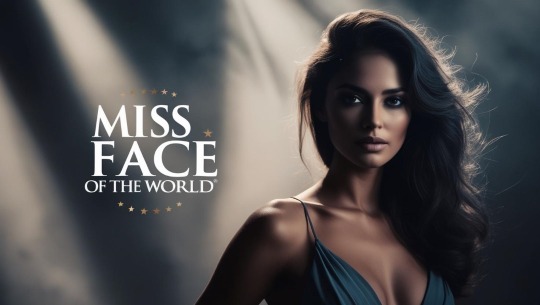
#beauty#beauttiful girls#pretty face#glamour#beauty pageant#pageant#pageantry#beautiful women#fashion#balenciaga#foriegn
3 notes
·
View notes
Note
Thank you again for doing this event, I’m so excited for your reading! ❤️
I would like to request a sexuality reading please, and thank you, and these are my placements:
Aquarius Moon, Capricorn Sun, Libra Mars, Capricorn Neptune, and Capricorn Venus
it is my pleasure! thank you for giving me the opportunity to delve a little bit <333

Okay, so let’s start off with the goat in the room (rim shot heheheh) - the strong Capricorn influence in your chart.
Capricorn is an expert when it comes to navigating the delicate balance between control and absolutely losing your shit because you’re sick of being responsible for everything. Oddly, I find that people who are heavily influenced by Capricorn thrive the more controlled they can be or enact control over others. This isn’t a bad thing, in fact for Capricorn it’s the opposite - the more they care, the more involved with the object of their affection’s life. You will not have to worry about anything with a Capricorn around. They ha
They tend to live in a world where tangibility is one of the things they value the highest. If I do this, what will the outcome be? How will I feel this for the rest of my life if I make this decision? This is a very utilitarian way to look at life but it’s comfortable. Cause and effect, action and reaction. They also tend to have this outlook when it comes to sex and intimacy.
They’re experimental, and like frankly, pretty freaky because they have to test all variables to understand the outcome. I will say that Capricorn placements tend to lean dominant but not always in the way that people think - people misguidedly take a really rigid view of that aspect of sexuality - but sometimes being the dominant partner just means you’re the one setting the rules, parameters, and expectations for the encounter.
It’s not all whips and chains (although that’s not something that can be completely ruled out either…) to be dominant, rather it’s in the influence you wield over a partner, something Capricorn has much of in relationships. Your partners likely really value your needs because you value theirs. They look to you for guidance in all areas and making you feel good is no exception to this.
In you personally, your Libra Mars is probably utterly magnetic. You likely exude sensual energy, there’s something about you people can never quite put their finger on, and it may make you the object of many projections or fantasies. Libras, to some extent, appreciate admiration so this could be a placement that makes you the type of person who enjoys watching your partner masturbate to you or creating situations where you know your partner is thinking of you, tantalized fully by every single bit of you. It’s not a sexually aggressive placement so your sex drive may be average to maybe slightly below but you make the periods between worth the wait with your dedication to experimenting.Aquarius Moon is great here too because it can help you detach from the stress of being so Capricorn heavy. I fear you guys really carry a lot on your shoulders so the “it’s not that deep” cool headed approach of Aquarius can help to make sex a more physical experience rather than one that’s fully in your head. I wouldn’t say that Capricorn’s are really repressed or ashamed of their sexuality but again, that serious, tangible nature may see it as impractical and they need a little help breaking out of that ‘I have to do to earn’ mindset. You can have pleasure, no work required.
5 notes
·
View notes
Note
I love your essays! I love that we can pick your brain. As someone that's kinda been living under a rock for the last 5 or so years... why does everyone seem to hate tom cruise?
(Please don't be upset! I'm genuinely asking!)
hey anon!! no worries, i'm glad you asked—i was in the same boat of curiosity and confusion myself for a long time. i used to be pretty ambivalent about tom, especially growing up in the early 2000s when the media and tabloids painted a very specific picture of him. it wasn't until i had some long, eye-opening chats with a friend that i started to reassess my own biases around him. we talked a lot about his involvement with the church of scientology, his personal life, and the ways the media has influenced our perceptions—not just of tom, but of anyone living under that intense spotlight.
this is a hard one to answer, especially publicly, i don't know the guy personally and never will, all i have is what i can tangibly see, read and hear, and i'm still on my own journey to better understand the hate and where it all stems from - as well as determining whether this discomfort i have for liking him as an actor is warranted at all. others in teh community probs do a better job explaining this stuff than me, but i'll give it a go - from someone that's learning to unpack her own biases and read between the lines a little.
a significant part of the backlash towards him seems to stem from his connection with the church of scientology (which most consider a cult as far as a cult is defined). while he is closely associated with the church, it's possible that he was more influenced by the organization than people realize. scientology has a history of using manipulation and control, especially over its most prominent members, and there's a part of the church specifically focused on recruiting celebrities. tom's fame and public image were clearly valuable assets to them, and some of the controversies that became headline news might have been shaped or intensified by that environment.
being in the public eye for decades subjects someone like tom to a lot of scrutiny, and confirmation bias often plays a role in how his actions are perceived. once a particular narrative is established—like his connection to scientology or rumours about his behaviour—people are more likely to interpret everything he does through that lens. this means that any potential misstep or unusual moment can be exaggerated to fit the story people already expect. tabloids and media outlets tend to focus on sensational aspects, particularly his scientology ties, reinforcing the same narrative over time, while more neutral or positive aspects often get overlooked or downplayed. now, this isn't me excusing anything, more ruminating on how we perceive people and events, and what lenses we do this thru.
some of the dislike also seems to be linked to personal moments being blown out of proportion. the 'couch-jumping' incident on oprah is a good example—it’s become iconic in a way that makes it easy to overlook that it was just a moment of enthusiasm. i remember seeing it back then and cringing a bit, but looking back, it wasn’t thaaat bad. cringe, yes. terrible? no. public opinion was influenced by pop culture too, like shows such as south park that mocked him and highlighted his scientology involvement. there are also rumours about his on-set behaviour being unpredictable, though i haven't done much digging into that. it might be worth exploring to get a fuller picture.
people tend to forget that celebrities, no matter how famous, are still individuals dealing with personal pressures and challenges—especially within something as controlling as scientology. i've heard accounts suggesting he tried to leave the church but faced obstacles like blackmail over confidential information shared within the organization. that perspective made me think of him more as someone caught in a difficult situation rather than just a willing participant. though... one has to acknowledge that these things aren't always mutually exclusive. i'm still learning, but this is what i know so far.
ultimately, a lot of the negativity around him seems to come more from the media spectacle than from who he actually is (if we can ever really know who that is). it's a complicated topic, and if you're interested, there are some insightful sources and interviews that explain how the church operates and how they might have influenced members, including tom. diving into those details might help you understand it a bit better. you don't have to love him, damn you don't even have to like him, but as long as you're doing your own opinion-cooking, you're sorted.
in the end, ig it's a personal choice—some people prefer to separate the art from the artist, and that might be the most balanced approach. it's the route i'd usually take, but i'm challenging myself rn by reading into it and trying to make more of an informed opinion on my own. jury is still out for me, but i'm comfortable with what i'm learning so far!
in short; cult associations, media being media, group mentality and confirmation bias. but again, we'll never know the guy and never know for sure what's what!
5 notes
·
View notes
Text
#the beatles#bug poll#i didnt add brians death bc thatd be too easy#yes the idea would be to fix them but we all have our own definitions about what that means#its funny ive had this question as a post with no expectation i would ever get the poll function#time machine#ive thought about this a lot#basically the contents of my head after being here one year#but especially after my brain fried on a month of get back#it has to be a pretty tangible event or action of one person#so whatever happened in india doesnt work but could ringo staying have helped? how about them never going in the first place#mine
75 notes
·
View notes
Note
Like a lot of people, I was very miffed with the ending of the Masquerade event for a while, at first, but after thinking more about it (at ungodly hours), it was pretty fitting in my opinion. It is not really different from how other overblot boys since they got off generally scorch-free, from the meta-perspective it sort of makes sense because this game makes us players empathize with these villains and there is a chance for them to repent on their own terms (most notably is Riddle). Rollo is still terrible, with the scale of his action, it would definitely confuse people why he's not arrested yet, the ending solution is not perfect but if NRC keeps on kicking him down and letting the public rip him apart then it not really solving the core problem at the end of the day, I feel like he would just double down on his beliefs. The event also includes several people who received forgiveness even in their worst moments (such as Riddle, Azul, Jamil, and Idia) so by letting Rollo take all the damage while only getting a slap on the wrist would make them massive hypocrites. But it also makes sense why Rollo is not getting the same mercy as other boys, such as Vil who almost get his image destroyed if revealed but he at least shows that he's remorseful and apologized a lot for it while Rollo didn't really show that he changed his mind after the debacle, but they're two different people and they deal with… genocide on a different level. NRC boys might not forgive Rollo but that doesn't mean they don't hold him accountable for his action, they called him out several times (how he blamed others but himself, how he endangered many people's lives, how his "justice" is wrong, etc…). From what I remember, after he is defeated, Rollo is willing to accept any punishments NRC boys would dish out for him, he is a ruthless person who expected ruthlessness in return, as that mob student said about Rollo, somewhere along the line of "he is hard on others as well as himself", Rollo failed his goal and he thinks he must be punished for his failure. But as shown in the story, NRC boys only gave out vague information and let the mob students come to the conclusion about Rollo themselves without correcting them, they pile so much admiration, care, and praise for Rollo that even he cannot correct them at that point, it is a pretty twisted punishment. It is not out of pity from the NRC boys' end either since they said Rollo can either confess to his sin (and get met by a large amount of betrayed and hurt from people who care so much for him) or he could just act as nothing happened, it a fitting punishment for someone like Rollo, someone who is hard on himself and can't come to term with the truth of his insecurities (which ties back to his brother). He doesn't get it at first and acts cocky but Malleus points out that he can lie to himself and others all he wants but he cannot lie to the Bell of Salvation, something Rollo tends for with great care, something that watches over everything in the city and the very thing that Rollo use in his goal, it also something that makes Rollo realize what the NRC boys are on about, it would be a never-ending guilt and remorse for him even if he doesn't acknowledge those detrimental feelings right away, it always there just like his want for salvation for others as an excuse to seek salvation for himself (trauma about his brother) and deflects any blames toward himself to take any responsibilities for what he caused. Forcing him into a situation where he has to confront his role in committing those atrocities or live every day with that burden as the person who internalizing guilt already, it is his own living hell, it is not a tangible punishment that everyone can see but from my view, it just means that it is substantially punishing to the one receiving it. So Rollo can either accept his sins and accept that he is wrong, he would still keep going every day and being seen as a hero, but his guilt and shame would only keep festering further, and it's something he would likely won't ever be able to get rid of.
Whew, a lot of points to go over here but I'll try my best and so that my response makes sense.
I mean, you do have a point. It would be strange if he had a much worse ending, considering what some of the others did that barely got a slap on the wrist for attempted murder among other things. Also, Rollo's attempt wasn’t necessarily to kill people (I don't think it was, maybe?). His intention was to get rid of all magic, which probably would've killed or lethally harmed those people who depend on magic.
But maybe you also have a point with Rollo's views and the characters involved. The main three specifically (Azul, Idia, Malleus), are all not human or not exactly human. He saw them differently when compared to Yuu, a magicless human. Rollo seemed genuinely interested and kind to Yuu, but the others he remained with a polite facade, but he obviously did not like them because he knew they were troublesome magic users.
His punishment, though... I guess that makes sense when you put it like that? But at the same time, it just doesn't sit right with me, but that's just my opinion. I was thinking about that, though. Rollo seems to be genuinely beloved by the town, and he just betrays them, BUT I don't think he sees it as betrayal. As you said in different words, he's highly deluded himself into thinking no magic is the answer for society when it's actually just his own solution that he conjured up due to the trauma and torment he faced from that specific event in his youth.
67 notes
·
View notes
Text
The Chokepoint Capitalism tour: Ottawa, Toronto, New York, San Francisco, Los Angeles (and beyond!)

I’m writing this from a hotel room in Ottawa, the day before the first event in the tour Chokepoint Capitalism, the book Rebecca Giblin and I are about to publish with Beacon Press; this tour is a little different from the usual so I thought I’d do a post explaining how it’ll all work.
This is my first tour since the pandemic hit; I had four (!) book releases during the first year of the lockdown and did a slew of online events. In some ways, these were amazing: I could do a UK event in the morning and a US event in the evening. But I don’t think anyone — not the booksellers, nor the readers, nor the special guests who helped me out — would say they were as good as an in-person event.
A lot has changed since 2019, and not all of it is pandemic related! For one thing, Chokepoint Capitalism is a book about the problems with monopolies in the arts world, and of course we published it with an independent press. Beacon is a part of the Unitarian Universalist Association, a venerable (168 year old) (!) progressive publisher that Howard Zinn and Albert Einstein (!!) praised as essential:
http://www.beacon.org/Assets/ClientPages/History.aspx
Independent presses are amazing but they don’t have the deep pockets for publicity tours that the Big Five can tap into, so this “tour” is really a series of events added onto my own working travel — largely trips I’m taking on behalf of EFF or in support of my activist work. That means the cities involved are a bit of a grab-bag, there are some long delays between dates, and the publicity for these events is a bit fragmented.
But the events themselves promise to be great. We’ve lined up fantastic booksellers and interlocutors, and Rebecca is coming over from Australia for part of it — it’s pretty hard to catch both of us on the same continent — let alone on the same stage! — so this is shaping up to be a fantastic couple of months.
The point of Chokepoint Capitalism is to break the deadlock that traps creative workers into thinking that they have to choose between rooting for entertainment companies or tech companies in hopes that their champion will reward their loyalty. Instead of praying for the largesse of rapacious monopolists, we set out a slew of detailed, shovel-ready proposals that will immediately and profoundly benefit creators, primarily by getting them paid.
https://doctorow.medium.com/structural-adjustment-fded18104bbe
We want these events to be a forum where creators and audiences can discuss how they can help put these plans into action, producing real, tangible outcomes that shift money away from giant companies and into the pockets of the creative workers whose works drive their profits. Please help us get the word out to the creators in your life about these tour stops!

The first of these events is tomorrow, in Ottawa, Canada. Amber Mac and I will be onstage for a keynote at “Canadians Connected,” CIRA’s annual conference:
https://member.cira.ca/Events/CanadiansConnected/About.aspx?websitekey=eeca1256-0fe3-4a11-9184-3c5d92990b1c

Next is Toronto, this Friday, Sept 16, at 7PM at Type Books in the Junction, one of my favourite neighbourhoods in my hometown, and the place where my grandfather and his 9 siblings were raised. Note that I idiotically previously gave the wrong date for this.
https://www.eventbrite.ca/e/chokepoint-capitalism-book-launch-with-cory-doctorow-tickets-418144450307
On Sept 19, Rebecca and I will both be at McNally Jackson in NYC, discussing the book with Kate Judge, author of the stupendous new book “DIRECT: The Rise of the Middleman Economy and the Power of Going to the Source”:
https://www.mcnallyjackson.com/event/rebecca-giblin-and-cory-doctorow-present-chokepoint-capitalism

From Sept 21–23 I’m appearing at Unfinished Live at The Shed NYC, with panels and solo presentations on competition, interoperability and digital human rights:
https://live.unfinished.com/
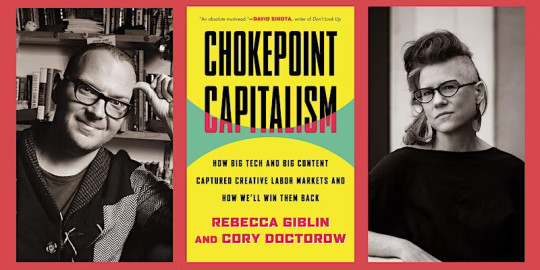
On the evening of Sept 23, Rebecca and I will be joined by Nilay Patel, editor-in-chief of The Verge, at an event hosted by the Engelberg Center on Innovation Law & Policy at NYU School of Law — it’s at 7PM at the Tishman Auditorium at 40 Washington Square S:
https://www.eventbrite.com/e/chokepoint-capitalism-funtime-book-party-tickets-411552222777

We’re in San Francisco next, for a Sunday afternoon event on Sept 25 at the San Francisco Public Library’s Koret auditorium in the main branch (100 Larkin St); we’re still confirming our special guest, but they’re pretty special!
https://sfpl.org/events/2022/09/25/author-rebecca-giblin-and-cory-doctorow
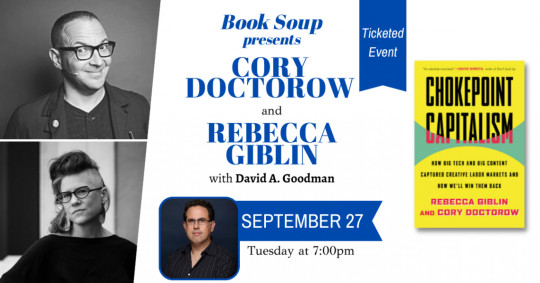
Then we head back to LA, where Book Soup is sponsoring an event with David A. Goodman, who led the incredibly triumphant Hollywood writers’ strike against the private-equity backed talent agency cartel; it’s 7PM on Sept 27 at the Beverly Hills Public Library Auditorium (444 N Rexford):
https://www.booksoup.com/event/cory-doctorow-rebecca-giblin
That’s all the stuff that’s confirmed and online, but it’s not the whole tour! Rebecca and/or I and/or both of us will be doing events later this year in Boston, Ottawa (again!), Montreal, Washington DC, Miami, London, and beyond. We’ll post details once they’re live.
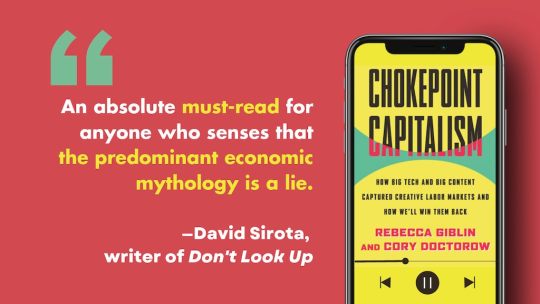
In the meantime, you’ve got less than two days to get in on our Kickstarter for the indie, non-Audible, DRM-free audiobook edition (you can also pre-order ebooks and print editions, as well as donating copies to libraries):
https://www.kickstarter.com/projects/doctorow/chokepoint-capitalism-an-audiobook-amazon-wont-sell/
Attentive readers will have noticed that the events for this event are happening before the official publication date for the book (Sept 27); that’s because supply chain disruptions pushed the on-sale date back. But have no fear, our publisher has assured us there will be ample supplies of the book at our events.
Image: Alex Schoenfeldt Photography https://www.schoenfeldt.com
CC BY 2.0: https://creativecommons.org/licenses/by/2.0/
[Image ID: A photo of me giving a talk at a bookstore.]
#pluralistic#events#labor#san francisco#ottawa#toronto#los angeles#New York City#libraries#creators rights
32 notes
·
View notes
Note
What is your writing advice for young people who want to write fanfiction and original stories in the near future?
If this is just Way Too Much, skip to the end (#16). My most important piece of advice is there. I also happen to think #5 is pretty good.
-_-_-_-
1) Literally just write. Write whatever you want, and do a lot of it.
_-_
2) You don’t have to post everything. In fact you don’t have to post anything. You can, don’t get me wrong, but it can be intimidating to sit down and think “I will now write something that other people will see and read and judge with their eyeballs.” Because that’s probably gonna lead to nerves and writer's block. Just write down the ideas that you have, the things you want to write, whatever’s in your brain that you want to explore and expand upon and make into something. And then if you want to, share it. Or don’t share it. I have plenty of half-baked ideas and documents and random story chapters and shit hidden away on my Google Drive that will never see the light of day, for a whole number of reasons. I wanted to write it but it wasn’t ~Spicy~ enough to warrant posting, or it’s only like an eighth of a good idea, or it’s like one scene with no story around it, or it’s just something incredibly self-indulgent I just wanted to write for my own enjoyment.
Point being, don’t write for other people. Don’t write so that other people can read it; write what you want, write for yourself, and then if you want to share it, do.
_-_
3) You can pretty much ignore any and all of these for fanfiction. In fact, you can ignore pretty much any rules or guidelines you want for fanfiction. Fanfic is a sandbox. You don’t have to be a “professional writer” to post fic. No one expects you to be Stephen King or Margaret Atwood. Fanfic is just for playing in a fandom and having fun. If you wanna write a 50 chapter slow burn with very little plot aside from the OTP slowly getting to know each other, and no real stakes or central conflict, I guarantee people would read that. Really, fanfiction is the Old West of writing: lawless, wild, unpredictable, and free.
However, here are the rules you must follow:
-Separate your paragraphs. (I’m sure you know this already, but I’m gonna say it anyway just in case.) Do not post one big block of text. Make a paragraph break when someone new is talking, when the characters are in a new place, when a new event occurs that changes the scene, when a chunk of time has passed, and when there’s a major change in subject.
-I know it’s obvious, but... grammar, punctuation, and capitalization. They exist to make writing easy for readers to read, and more people will read your stuff if they don’t have to stop and try to figure out what you meant.
-Use tags and labels, as is possible with whatever site you’re using. Especially if you include possibly triggering content in your story. Again, I know it’s obvious, but it’s common courtesy. Bonus: tagging the themes and content of your story helps readers find it and read it :)
-If possible, limit the use of all-caps and exclamation marks / question marks. 99% of the time, one ! or one ? will do. If you overload the page with a lot of all-caps and long rows of exclamation marks or question marks, it hampers readability.
... That’s literally all I can think of. And, like I said, it’s all pretty basic stuff. You were probably rolling your eyes like, “Uh, yeah, Gwen, I know.” But that’s literally it. You can pretty much do whatever you want in fanfic.
That being said, here’s my advice for both fanfiction and original work...
_-_
4) A quick and dirty rule for coming up with a plot, starting a story, keeping up pacing, or maintaining tension: figure out what dreams, desires, and goals are nearest and dearest to your main character’s heart (see #16). Then set up the main conflict to be directly in opposition to that goal. It doesn’t have to be in a tangible way, though it could be. But, if your main character wants more than anything to reach the ships on the southern coast of your world and sail to a new life, make sure the main conflict immediately prevents them from doing that - in fact, make sure to send them north. If your main character just wants to keep their loved ones safe, kidnap the loved ones. If your main character just wants to date their best-friend-turned-crush, make sure they think they have no chance - or, make them cocky about it, and make sure it makes Person B determined not to ever like them. You get it. Figure out what your character most wants, and then keep them from having that. Boom - your conflict now ties in with your character's motivation. It's like instant yeast for plots.
_-_
5) If you’re anything like me, you want your first draft to be Good, despite all that advice about how the first draft doesn’t have to be good and it’s just to get words on the page, yadda yadda. And if you’re somewhat of a perfectionist (like myself), it’s easy to get stuck looking at a blank page because you don’t have The Perfect Words, and you want what you write to be Good the first time.
Here’s how I cheat that:
Instead of trying to write a Good First Draft from a blank page, hit the enter key a few times, skip a little down on the page, change your ink to red (or blue, or whatever - just something immediately identifiable as Not Black) and just thought vomit. Write whatever the hell you’re thinking, exactly as you think it. Don’t worry about it being readable, don’t worry about narrative flow for now, don’t worry about covering all the details, don’t worry about anything except either a) getting all the details of your idea out onto the page, whether that’s a lot or whether it’s just a sentence or two, or b) if you don’t have an idea yet, finding your way there.
Because this method is also very good for finding your way to ideas when you’re stuck in writer’s block.
Because of how human brains work, getting this stuff out onto the page - in all its messy, stream-of-consciousness glory - will likely spark more thoughts. As you write your original idea about the scene, it’ll likely spark more ideas. Creation begets creation. If you just start thought-vomiting your ideas onto the page, chances are you’ll think of more things as you go, and you’ll start filling out description or dialogue or tone or action or whatever, and pretty soon the scene starts writing itself.
Not sure where you’re going with the scene or which ideas you wanna use? Use a lot of ambivalent language in your “thought-vomit draft.” My pre-writing notes are chock-full of the words “maybe,” “perhaps,” and the phrases, “At some point...” and “...or something like that.” In this way, I don’t tie myself down to one idea; it’s just an idea, and I’m keeping it on the page in case I use it, but I might chuck it in the trash or change it or whatever.
And then, once your ideas for the scene (or story, or chapter, or whatever) are on the page, then go back to the top and start translating them into a “real” first draft. Use black ink, and start copy-pasting chunks of the thought-vomit up into the top part of the document and translating them into Draft 1. Separate out paragraphs where paragraph breaks should be. Add the correct punctuation and whatnot. Change “describe the lobby here - include potted plants, fancy carpet, blood stain, etc.” into an actual description of the lobby. Flesh it out, or condense, or whatever it needs. And if you’re still stuck, change back to red ink and ramble some more until you find a path that feels right, then plug that in. This keeps you from looking at a blank page, and it allows you to generate a kind of Draft 0.5, somewhere between a plan and a first draft.
You don’t have to use every idea. Like I said, jot down whatever comes to mind, put a “maybe” before or after it, and keep working. If the idea grabs you and you wanna keep expanding on it and exploring it, cool. If you just wanna jot it down so you don’t forget it and then move on, also cool. Red-ink draft / “thought-vomit draft” is your time to jump around in the timeline, add or finesse details at whatever point your brain moves to, etc. Don’t try to do it exactly in story order, because you will get tangential thoughts and ideas, and you will not remember to write them down five pages later when you finally get to taking notes on that scene. Trust me. On that note...
_-_
6) Write everything down the moment you think of it. Seriously.
“I’ll remember it when I get around to writing that scene in a couple days / weeks / months (/years).”
You won’t.
Write it down.
Phone, journal, google docs - hell, my family regularly laughs at me for grabbing a napkin during dinner and scribbling thoughts down alongside pasta sauce stains.
And then, once you have it written down somewhere...
_-_
7) Consolidate your writing ideas in one place.
Maybe this isn’t really your style, and that’s totally chill.
Buuuut, if you’re Type-A like me - or if you tend to be somewhat unorganized and you know you’ll lose track of your writing notes if they’re scattered across multiple notebooks, journals, napkins, phone notes, etc. - having one consolidated document of notes is a life saver. I keep mine on Google Docs so I can access it, add to it, and look through it for inspiration anywhere at any time. When I have one of those Shower Thoughts that I jot down on my phone or on a napkin during dinner, I set myself a reminder on my phone to type it up in my Story Ideas document later.
(Or, if the idea I had was for a story of mine that I’ve already started planning / drafting / whatever, I put it in the document for that story instead of the Big Random Story Ideas doc. You get it.)
_-_
8) Have other ways to collect and save writing ideas, besides just writing stuff down. If you like Pinterest, make pinterest boards of your characters or stories or settings or whatever. If you’re big into playlists, make a playlist for your character / setting / story / etc. Or both. Or something else. I’m not good at drawing, but maybe you are, and maybe you like to draw your ideas. Whatever form it takes, having another way to save ideas and think about your stories is invaluable.
_-_
9) Some writers can just start writing with no idea where the story is going, and they just kind of figure it out as they go. I envy those writers. And I do that sometimes for fanfiction, where the stakes are somewhat lower and the audience is reading more for scene-to-scene enjoyment (and to see their OTP kiss) than for a Driving And Compelling Narrative.
But here’s the thing: especially if you’re just kind of starting out, writing without some sort of plan is really, really hard, and will likely lead you into a slow, meandering narrative that will likely frustrate you.
Even if you think you’re someone that just can’t write with a plan (and again, I have the highest respect for pansters out there - I don’t know how you do it, you crazy bastards, but you keep doing you) - even if you think “I can’t work with plans, they’re too prescriptive, I just want to write and see what happens -”
Try at least making the most skeletal of plans.
Even if you have no clue what 90% of the story is, yet. That’s fine. But you need to have some idea of what you’re building to, even if that’s nothing more specific than a feeling, or a turning point for your character. Even if your entire plan for everything beyond Chapter 1 is, “At some point, Charlie needs to realize that Ed was lying to her.”
This is where those Draft 0.5 notes come in handy. Because, more than likely, working on your current scene that way will spark ideas for later scenes, which you can put down at the bottom of the document and save for when they become relevant. In my experience, the line between planning ahead and making a Draft 0.5 is exceptionally thin. One can quickly turn into the other.
If you’re really, really resistant to the idea of planning ahead, that’s okay. It’s not everybody’s style. But for the love of all that is holy, write down your ideas for future scenes, even if you’re a person that doesn’t like to plan and writes only in story order, because you will not remember that idea once you get to that scene.
_-_
10) You don’t have to write in order.
Here’s the thing: I’m a person that can only do my Draft 1 in story order (meaning, chronological order). I just have to be in that flow; I need to write in story order for me to best channel where the character is at from scene to scene, both narratively and emotionally.
But my Thought Vomit Draft is another thing entirely. By using the brain hack of putting my notes in red (or another color, it doesn’t matter) and going down to the bottom of the document / page and taking notes there, and then integrating them into whatever plan I have, and then translating them into Draft 1 once I get there in the story - by doing that, I can get my good ideas onto the page (and expound upon them and let my muse carry me and ride that momentum while I’m in the moment of inspiration) without writing out of order.
Maybe that’s just me. But if you’re a person who really prefers to write in story order, that could be hugely helpful to you. It is to me.
_-_
11) Emotion and motivation will do more for your story than technicalities of plot.
If your characters really care about something, and their journey through the (shaky or weak) plot is emotionally engaging, it will be a much more compelling story than a story with a “perfect” plot and unrelatable or unmotivated characters.
If your characters care about what they’re doing, and it means something to them, and their goals and actions are driven by dreams or fears or emotions that are integral to who they are, your audience will care too. If you have a perfectly crafted plot that hits all the right beats and has high stakes and fast pacing and drama - but your characters don’t connect with what’s happening in a way that’s deeply meaningful or emotional for them? You’re gonna have a hard time engaging readers.
When in doubt, prioritize character emotion and motivation over plot. Emotion is what drives story.
This power is highly exploitable. (Just look at pulp novels and shitty but entertaining movies.) You can even use it to glaze over plot holes or reinvigorate a limp narrative. Use it that way sparingly, though. It’s a band-aid, not a surgery.
_-_
12) Evil villains are hard to write - mostly because there are very few truly evil people in the world. (There are a few. Billionaires and several big name politicians come to mind.) But by and large, there aren’t that many evil people. There are plenty of bad people, but bad people have some good in them, somewhere in there. Trying to write an evil villain is hard, because they often turn very cartoony.
Here’s a tip: it’s much easier to write antagonists who aren’t evil. Even if they’re bad people. Of course, there’s no reason you can’t write a villain that’s just truly evil - a serial killer, or an abuser, or a billionaire, or someone who legit just wants to hurt people or blow up the earth or stay in control of an oppressed population, or whatever. But chances are, it’s gonna be really hard to make them feel real, and even harder to create a plot around them that doesn’t feel forced or contrived.
Instead, try writing an antagonist / villain whose motivations and goals directly clash with your protagonist’s - but not because they want to take over the world or see people suffer. Write an antagonist who’s chaotic good, but whose perception of the situation is completely opposite from your hero’s. Write an antagonist whose only desire is to save people, and who will do anything to achieve that goal - anything. Write an antagonist who believes in the letter of the law, and will hinder and oppose the hero’s methods even if they agree with the hero’s motivation. Write an antagonist who got in way over their head and did some things they regret, and now they don’t know how to get out, and they’re doing their best but whatever they set in motion is too powerful for them to stop now.
Write villains who are human. Write a killer who thought they were doing the right thing by taking their victim out of the equation, who vomits at the sight of the body and sobs over the grave they dig. Write a government leader who truly believes she’s doing what’s best for her people in the long-term, even if it might hurt them in the short term, and is willing to endure the hatred and belligerence of the masses if it means securing what she thinks is a better future for her people. Write a teenage bully that thinks they’re the one being picked on by the world, and they’re just fighting back, standing their ground. Write a scientist who will break any code of ethics and hurt anyone he needs to - in order to bring back his baby sister from the grave, because he promised her he’d protect her and he failed. Write an antagonist who is selfish and self-centered and capricious - because in order to survive they had to look out for Number One, and that habit ain’t about to break anytime soon.
Write villains who aren’t even villains. Write antagonists who oppose the hero because of moral differences. Write antagonists who are trying to do the right thing. Write antagonists who treat the heroes with kindness and dignity and respect and gentleness.
They don’t have to be good. They don’t have to be Misunderstood Sweethearts who “deserve” a redemption arc. They can be cruel and nasty and dismissive and callous and violent and etc. etc.
Just hesitate before you make them Evil-with-a-capital-E. Because evil is hard to write, and honestly, boring to read. Flawed human beings with goals and motivations that directly oppose the main characters’ are much easier to write and much more interesting to read.
Ask why. Why is your villain trying to take over the world? What does that even mean? Are they trying to create a Star-Trek-like post-capitalism utopia, but they know that won’t happen in a million lifetimes, so they’re trying to do it by force? Are they actually super in favor of human rights, but they got very impatient waiting for the world to do anything about poverty and war, so they decided to take it into their own hands? Are they determined to fix the world - no matter the cost? Are they terrified and overwhelmed, but committed to see it through to the end? Or - maybe they’re just doing it on a dare. Maybe they don’t really give a shit about world domination, they were just a mediocre rich white guy who decided to fuck around and find out, and now he’s kind of curious how far he can take this thing. And now he’s kind of an internationally-wanted criminal, so he’s kind of stuck living on his hidden private island in his multi-billion dollar secret base, strapping lasers to sharks’ heads for the hell of it. Gross, selfish, uncaring, and dangerous? For sure. Evil? Depends on your definition. See, now we’re getting somewhere.
_-_
13) It’s tempting to let the plot control the characters. It’s easy to drop your characters into a situation and see how they react. But here’s the thing: that doesn’t drive plot. In fact, it bogs down pacing. Instead, try to build you plot off of your characters’ actions and decisions. Let your character build their own situation. Not to say it should go they way they wanted it to go; in fact, usually, their grand plans should go to hell very quickly. But having the characters take action and make decisions, and letting the plot develop based on that, is much easier to make compelling than making a rigid series of events and then trying to herd your characters into them.
_-_
14) Having trouble justifying a character’s actions? Consider having them make the opposite decision, or having them approach the situation in a different way. For example: you need your character to go meet the bad guy, for plot reasons, even though there’s no way it’s not a trap. If the character goes, readers are gonna be groaning with their head in their hands, because c’mon man, that was really fucking stupid. But he’s gotta go, because the plot needs that. Two ways you might handle this: a) He knows it’s probably a trap. He decides not to go. The plot conspires to get him near the villain anyway. Or, b) He knows it’s a trap. But he needs to go, for (insert reasons here). So, he approaches it in an unexpected way. He brings backup, recruiting a side character we met earlier in the story. Or he arrives on the back of a dragon, because ain’t nobody gonna fuck with a dude on a dragon. Or he goes - early, and ambushes the villain. It may work, it may not. He may get himself kidnapped anyway. But it moves the plot along without having Stupid Hero Syndrome.
_-_
15) This is a legit piece of advice: if all of this sounds overwhelming, literally just ignore it and write what you want. For real. Writing should be fun, and every single writer operates differently. If you’re sitting here like “I’m getting stressed just reading this,” just flip me a good-natured bird and get on with your life. I promise I won’t take it personally. Same goes for literally any other writing advice you see. Lots of rules and guidelines can very quickly make anything thoroughly un-fun. Just write. If you’re passionate about it and you do it for long enough, you’ll start figuring out the tips and tricks on your own.
_-_
16) Here’s the best piece of advice I can give you: know your characters. More importantly, know what’s important to them. Build their personality and decisions off of that, and build your plot off of their decisions.
I see a lot of character building sheets that ask a shit-ton of questions like “What’s their most prized possession?” “Do they like their family?” “What’s their favorite food?”
And while these are good questions, my problem with this type of character building is that if you start there, with the little stuff, you’re building on nothing. IMO, to make a truly strong character (not strong like Inner Strength, strong like effective), you need a strong foundation.
Here are the things you must know about your character:
a) What are their greatest fears / deepest insecurities? And I don’t mean “wasps” or “heights.” I mean the deep shit. I mean fears like “living a meaningless life,” or “turning out just like their parents,” or “that no one will ever love them,” or “being powerless.” You may say, “But they’re really scared of wasps! They fall into a wasp nest when they were little and got stung so much they almost died!” Great! That’s a fantastic bit of backstory. They should absolutely be afraid of wasps, and that should absolutely be an impediment later in the story. But dig deeper. What about that event actually scarred them? Was it the helplessness? Stumbling around, swatting at the air, not being able to do a single thing to stop what was happening to them? Was it that they were alone, and no matter how loud they screamed, no one was coming? Was it the bodily horror of feeling themself turn into an inhuman creature as they swelled up from the stings, unable to move their fingers or face normally anymore?
And don’t forget insecurities, because those factor in, too. Are they deeply insecure about their identity? Do they believe, deep down, that they’re ugly? Did they grow up poor and they’ve always been really touchy about that? Why? Dig deep. Figure out what really, really bothers them.
b) What are their hopes and dreams? What do they truly want out of life? What do they consider the most valuable to their experience here in this thing called life? Is it the freedom to forge their own path and be independent? Is it the approval of their family or peers? Is it a home? Is it knowledge, or understanding? Spiritual fulfillment? Is it deeply important to them that they contribute to their community, or protect those they love? What do they need in order to feel truly and deeply fulfilled in life?
Figure out those two things (each one encompasses several things, btw, you don’t have to stop at just one for each), and then use that to inform how they behave and the types of decisions they make within the story.
It also informs character behavior and personality.
Let’s say we have a character who’s afraid of helplessness. They’re probably gonna be the person that always wants to do something, try something, no matter how hopeless the situation seems. They’d despise just sitting and waiting, probably, because it makes them feel powerless. They might even be the person that makes rash decisions and acts impulsively and puts themself in danger unnecessarily, because in their mind it’s better than being at the mercy of fate. This is one way you could use a character’s personality to inform their decisions, which in turn helps to inform plot.
Or, let’s say we have a character whose greatest fear is being left behind or forgotten. We may have a chatterbox on our hands. They might be obnoxious. They might love the spotlight, constantly vying for attention no matter the situation, because deep down they’re so afraid that they’d be forgotten otherwise. Or, it may go the opposite way. They may be so afraid of people leaving them that they’re terrified of bothering people. They don’t want to do anything that could annoy people, anything that might give people a reason to leave them. They might be exceedingly polite, quiet, accommodating. A push-over, really.
These are two nearly opposite types of personalities, both stemming from the same core fear/insecurity. You can go a lot of different ways with it. But if you build on that strong foundation, you’ll have a strong character, and a stronger plot.
Likewise, the structure of your story can and should inform the design of these character traits. If you need your characters to team up near the end, it may be impactful if you give your main character a deep fear of commitment, an insecurity about being unwanted or left behind, and make them highly value independence and freedom. That could make their team-up for the final battle very meaningful. Conversely, you can use your character’s deepest fears and desires to help design the plot. Is your character deeply insecure about voicing their opinions or taking a stand, because of trauma they faced in the past? Make them face that. Build that into the climactic third act. Give them the big inspirational speech where they stand up and talk about what they believe to be important, what they think the group should do. And then design that character arc to run through the story, giving you more handholds and stepping stones, more pieces of foundation on which to design the plot.
In this way, character should inform story as much as story informs character. It’s a feedback loop.
Bonus: if you build your character and your plot off of each other in this way, it automatically starts to build in the foundations of that emotional investment I mentioned earlier. If your character’s decisions are based on what they most want and do not want in life, you basically have your character motivation and stakes pre-built.
Note: you need to know these things about your villain, too.
-_-_-
I’m genuinely sorry about the length of this, lmao. But you did ask.
Best of luck!
Edit: I forgot an important one:
17) Start when the scene starts and end when the scene ends.
What do I mean by that?
If your notes say “Danny asks Nicole out after school and majorly flubs it,” start the scene when Danny approaches Nicole after school. Better yet, cold-open the scene on “I was wondering if, you know, you’d wanna. You know. Hang out some time?”
Don’t start that morning when Danny goes to school, unless you’re gonna cover the school day in like one or two sentences. Don’t spend whole paragraphs going through the school day, unless it’s to cover other plot points first (in which case apply these same guidelines there), or if the paragraphs are there for a specific reason, like to illustrate how stressed he is and how it seems like every little thing is going wrong. Even then, trim the fat as much as possible. Expounding and describing everything Moment-to-moment is for the meat of the scenes, not the leading-up-to and coming-away-from.
Here’s my rule of thumb: study how and when movies cut from scene to scene. Movies have exceptionally strict, limited time for storytelling; they’re excellent examples of starting a scene when the plot point starts and ending when it’s over. If you can’t picture a movie showing everything you showed, start the scene later and end it earlier.
#asks#anon#writing advice#writing tips#writing#fanfic writing#fanfiction#character creation#plot development#character development#my advice#original writing
730 notes
·
View notes
Text
Talks Machina Highlights - Critical Role C2E127 (March 2, 2021)
Tonight’s guests are, of course, Ashley Johnson and Marisha Ray!
Marisha, on her thought process behind the date: “It was a fascinating study on designing something with another player in trying to navigating how to do that in a way that makes sense and wouldn’t be too metagamey or overly scripted or anything like that. I had a bunch of ideas thought out, then I just typed it out and sent it over to him, and then he interpreted it as such.” Liam had ideas, but Marisha wanted him to keep the details a surprise. The theme of “let’s start over” was the leading motif for the design. Three acts: pre-game cocktails at the Nestled Nook, picnic in a field of Xhorhasian wildflowers, and then close it with after-dinner drinks and hot tub at the Steam’s Respite. And the very last thing was “and all the cats were dogs”. Brian: “What was his response to that?” Marisha: “He texted me and was like, ‘Are you serious or is this dog thing a joke?’”
Ashley is asked what it was like to know it was coming but not know the specifics. “For both of us, I don’t think we thought it was going to be right then. I think because it’s been so long in the relationship between Beau and Yasha and it felt like such a natural progression for the two of them, and they’re both awkward together. I think there was something to just being thrown into it.” She spent time thinking about what things Yasha would talk to Beau about on a date. “We got to maybe one of them. It was just so fun! Exploring romance in D&D can be super weird, especially when you’re streaming. But it felt like that’s where our characters were going. There was that excitement of trying something that is out of my comfort zone, and I think so much of Marisha was part of that, as being the initiator as Beau, where I was like, okay, this is where it’s going it. Let’s do it, let’s see what happens!” She mentions how “fun and freeing” it is to trust your improv partner in something like this.
Marisha: “I just wanted Beau to be a fuckboi!” But she highlights that it’s hard to deny the deeper connections that come up in D&D scenarios. “They’ve been with each other through so much that it’s difficult to deny when those bonds start to happen.” She texted Liam in a panic before the game. “What do I wear? And he said, ‘In the game or in real life?’ Both!”
Marisha was expecting a Sam curveball at some point. “My/Beau’s reaction of ‘I love you!’ was pretty accurate. She does care! She’s not just a troll trying to ruin our shit.”
Marisha on Yasha liking dogs: “I clocked that shit when you bought a dog figurine.” She keeps notes about all the members of the party when they reveal things like that.
Ashley has started taking more detailed notes, partly to play catch-up for events she may have missed earlier. “Turns out, notes are very helpful and can help you in your RPing!”
Favorite parts? Marisha: “The fade-to-black moment at the very end, and I think it’s because Ashley’s eyes--maybe this is going to get weird--we had this moment where we were in the hot tub at the end, and I looked over and was like, ‘hey’, and you looked over and were like, ‘hey’, and I was just dead. I will never forget the look on Ashley’s face. There was just a pure moment.” Ashley: “That’s so funny, because I was going to talk about this one moment with Marisha. It’s just clicking into the scene and clicking into the moment.” Marisha talks about how the moments associated with the game have real, tangible emotional connections. Brian highlights that the emotional side of things is what you remember the most after the campaign is done.
Character thoughts on Kima? Marisha: “I was like, step on me! Please! Both of you! We’d be friends.” Ashley: “It’s also that nostalgia that feels so good at the table. These characters we know and love are still living and breathing and happy together and just kicking ass. For Yasha it was an amazing example of a relationship that works in this world, and something beautiful that these people who are different but are connecting. It was a lot of-- it was cool. I think Yasha’s a very big fan of Kima and Allura. When she gave over the sword, Travis texted me and was like, it’s the Holy Avenger. Looking it up and talking about it, it was like, holy mackerel, this sword is insane. But there’s going to have to be some conversations had to attune with the sword. But I like that Matt presented that challenge, that this isn’t necessarily in your class, but let’s do some RP and see what happens.”
Where’s Yasha at with the Stormlord right now? “I’m curious to explore that more, but knowing that the Stormlord was the first person to bring her back to her own will, of pulling her out of whatever was happening with Oban and the Laughing Hand for however long. It’s also weird to see the relationship that the clerics have, and I think Yasha’s still figuring out how to be her own person, but also... not serving somebody, but still trying to figure out that relationship with her god. But again, he saved her from a very, very dark place, and I think that’s something she values and holds on to.”
Cosplay of the Week: An amazing Essek! (Blushingvioletcosplay on Instagram)
How is Beau handling the Eyes? “All the theories! It’s hard for it to not feel like a ticking time bomb. I always have to try and separate my theories from Beau’s theories. That’s acting and shit. I, Marisha, am very interested if I can somehow utilize this to our advantage. Beau, also interested but simultaneously terrified that it might be a bad idea and I might just get further initiated. When it comes to Matt, you know there’s always something more lurking underneath all of this. As players it’s kind of our job to navigate that.”
How about Yasha? “I think it’s one of the things that didn’t really come up in the date, which is funny, because it’s something I was thinking about. Me as a player, that’s something I’m extremely stressed about. We don’t know what’s going to happen. We kind of got into it, but I think the fact that Lucien was listening, and the Eyes, I think it made me as a player as Yasha very nervous about interacting with Beau, because I don’t know what they’re picking up on. There’s so much we don’t know, and Lucien is so confusing, and the Eyes, and with Matt... we don’t know! It’s a point of extreme concern for Yasha, especially someone that she has feelings for and cares about, it’s an extra level of I don’t know what this means and I can’t lose this person, but I need to protect at all costs.”
What was it like for Beau to discover that Dairon and the Soul not only listened but took action? “That moment was so deeply powerful. Honestly, I was just as taken aback as Beau was. I never in both mine or Beau’s thought process did I think Matt would take action in that way, or that would ever be handled. And I think that’s what makes it so emotional. You condition yourself to think these things just happen, so much so that they permeate your D&D game. So rarely do abusers get held accountable for their actions. What was powerful about it was that he was, and other people cared. That alone was so emotionally impactful, and I was completely thrown by it. I feel like I had to walk away from that situation kind of unpacking those things. What does that say, what does that mean? Same thing for Beau, where the cycle of abuse has happened repeatedly to her with no repercussions to anyone who’s causing it. It’s why she’s always had a weird tenuous relationship with the Soul. It throws you into these layers of reconciliation and thought. I didn’t think this was going to be addressed. What does that say about society? So many different layers to peel back. It all speaks to so many real-life experiences that happen every damn day to so many people. There’s not many examples in media of abusers getting handled, and especially not in a way that’s not some sort of device to motivate somebody.” She highlights how rare it is that the abuser was handled without pulling the victim into the mess. I’m definitely not doing what she’s saying justice with my speed-typing.
How is Yasha feeling about solidifying her identity as a protector? “Putting together this character and starting to play as her, there was a part of me that wanted-- when I work on characters, you go through the list of questions you have as an actor, what’s your motivation and all that stuff. But I very much wanted to see if I could have a character that doesn’t necessarily know what their purpose is, because I feel like a lot of people feel that way. I think when we see movies or TV shows, there’s always a character who says, I know what my purpose is. I wanted to explore what it meant to not know what that is. I left that open with Yasha, and I didn’t want to set that for her, because I thought that was an interesting thing. I still like that idea, but in the conversation with Beau and knowing the date was coming up, there were a lot of internal conversations I was having of how is Yasha feeling in this moment. At the end of the day, I feel that’s a very solid purpose for Yasha in this moment, of all I can really provide is protection - and of course she can provide more than that. But now I’m just, yeah, I think protection for her is the best way she knows how to describe her purpose.” Brian: “And once we arrive there, the goal is to find a greater purpose, to be of service.” Ashley has tied in Yasha’s protectiveness with her grappling with loss.
Fan art of the week: A second amazing Essek! (by Saturday_sky)
Thoughts on the amulets: set-up or bad luck? Ashley: “I thought they were a set-up!” Marisha: “I think [Astrid’s] an opportunist. But I think it’d be much more convenient if anyone other than her killed Trent. To what end, I don’t know.” Ashley: “Me, personally, how I interpreted her crying in that alleyway, I felt like she was crying because of a betrayal. But I don’t know! I think she definitely cares for Caleb.” Marisha: “I also got betrayal tears. That felt like guilt-crying to me.” Brian: “I don’t like any of this.”
What prompted Beau going full assassin? “If they were to get in and out and I could have jumped over that tower without killing that guy, I would have.” She didn’t have a lot of options as a monk and not a rogue assassin, but needed a quick and quiet way to get him out of the way. “I went through so many ideas in my head. I thought of an idea to dump all of the ball bearings under him, then light fireworks” to try to get him to fall off the edge.
Is Yasha’s hope for Molly still alive? “Yes. I think that because Yasha has been on the other end of doing terrible things under someone else’s influence, she has a lot of forgiveness for people. At this point, of course, it’s hope that he’ll come back or have some type of recognition of his life as Molly. There’s a lot of questions. I don’t think she’ll ever give up on him.” The only moment of hesitation was when Lucien was cool with Gelidon leaving with Beau.
How are they feeling about their odds? Ashley: “I feel really great about the ideas that the group has to get out of tricky situations. This one I’m nervous about.” Marisha: “I agree. We have our little side player thread, minus Matt, and I don’t see how we’re getting out of this without some sort of compromise that’s not necessarily in our favor. I think we’re going to get out of it, but I don’t think we’re going to get out of it completely.”
Ashley didn’t tell Brian about the date after the episode ended, but wound up blurting it out right before he was about to watch the episode for Talks.
378 notes
·
View notes
Text
some thoughts on one of the datamined/leaked characters and Inazuma
Specifically, about this funky Aetherface-looking dude + some stuff about the Electro Archon got in too, somehow :/
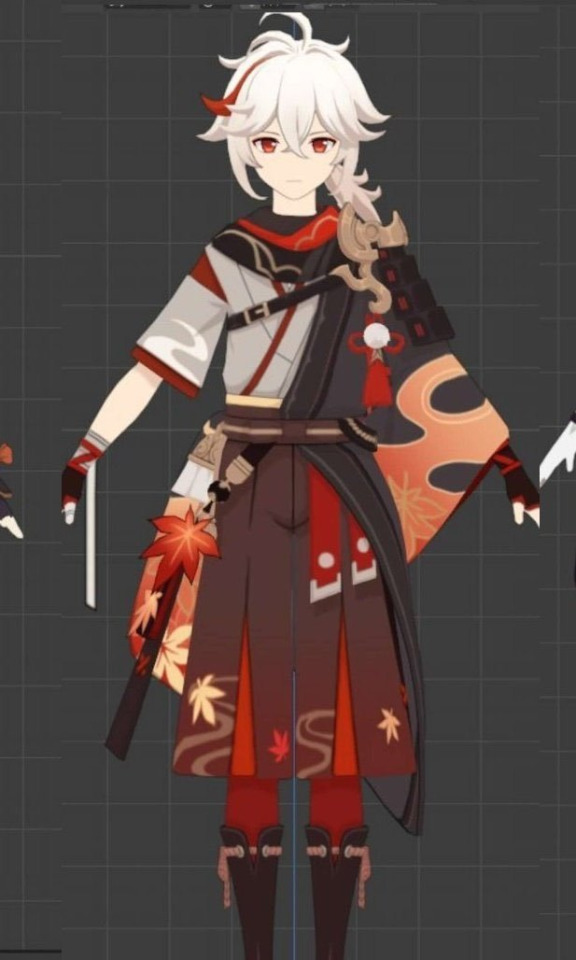
(watch as this gets debunked into the ground when the Inazuma update is released)
What are the scraps that we know of him so far? Well, his name is “Kazuha”, and he’s going to be an Anemo Sword!
Yeah there’s been some prior misinformation about him being a pyro polearm (even I thought he was going to be pyro sword), but that was more just him getting confused with this other guy called “Tohama” (who’s also supposed to be Ayaka’s (arranged) fiancée? No idea how that’s going to turn out). Plus, you can see Kazuha’s Anemo Vision on the second pic here:


It appears to be an autumn motif instead, which is also pretty cool and can still tie into the wind theme
The second thing I did notice though (first being ooooo new pyro character) was that he looked like a samurai. It’s also why I had doubts about him being a polearm user.
*[Yes I know historical samurais have used bows and spears in the past. But even Japanese media pushes the “samurai = katanas” angle, and Kazuha strikes me as more of a “pop culture-style Japanese swordsman” than a historically-accurate one if you get what I’m saying.]
To digress a little; how’s Inazuma looking? Well, according to Zhongli: the Electro Archon, also known as “Baal” or “Raiden”, has issued a “Vision Hunt Decree” to confiscate her people’s visions and decorate them on the hands of a “thousand-armed statue”, as well as closing off the country. Furthermore, it is said that no one has received an Electro Vision in a year in-story by “the will of the Electro Archon”.
There is a runaway NPC from Inazuma to Liyue called “Atsuko”, who provides a tangible picture of Inazuma’s current state of affairs:

As pointed out in this reddit post, Baal’s actions are a parallel to other real life Japanese rulers such as Toyotomi Hideyoshi & Tokugawa Ieyasu; from closing the country and confiscating swords (visions) from the populace, up to melting all the swords to create a giant metal statue (that one didn’t work, but it’s the thought that counts).
**[my personal thoughts on this is that someone or something else has either succeeded or stole Baal’s position as the Electro Archon, which would explain the sudden extreme personality change.
Like, try to think of this in terms of the in-story timeline - the lockdown specifically happened a year ago; no one knows what’s going on inside Inazuma, nor does Inazuma know anything about the outside world. Thus, the Electro Archon shouldn’t know about ‘recent events’ like Venti getting his gnosis stolen or Zhongli’s “”death””, so her/their(?) current actions are definitely not influenced by what’s happening to the other Archons - this was something the Electro Archon decided to do on their own, independently of the Tsaritsa’s/Fatui’s plans.
Venti has explained before that anybody with a vision is capable of becoming a god, so the possibility is there. Hell, they may even be posing as Baal and hiding the truth of their ascension for some reason.
If you’re familiar with Japanese history, then think about how Toyotomi Hideyoshi and Tokugawa came to power in the first place.
To summarize briefly: Hideyoshi was originally a vassal of another warlord called “Oda Nobunaga”, who united most of Japan. However, Nobu was betrayed and killed by another one of his vassals known as “Akechi Mitsuhide”, so Hideyoshi stepped up and finished the rest of the job.
After Hideyoshi’s death, Tokugawa (and 4 other men) was supposed to look over his son until he was of age to rule. But Tokugawa was growing in popularity at the time, so he stepped to take power himself.
So in the context of the Genshin story, perhaps the “Toyotomi Hideyoshi” and “Akechi Mitsuhide” figures are being fused together (aka: this person killed the previous Electro Archon and took her place). Or it’s a Stanley/Venti’s friend situation 2.0
Plus, it’s added dramatic irony to the whole ‘God of Eternity’ also being the god of lightning; something fundamentally transient and brief. Their so-called ‘eternity’ is as fleeting as a lightning bolt, or something.]
~
Anyways, back to Kazuha.
If we’re going with the implication that the Archons are responsible for giving out their respective elemental Visions (others have theorized about this too); then what does that say about Kazuha, who has an Anemo Vision (proudly displayed in full view too!) given by the God of Freedom?
I’m going to go out on a limb and assume that Kazuha may turn out to be a “wandering vagrant” or “ronin”-archetype character; kinda like what Miyamoto Musashi does. A vagabond that wanders the land and maybe hides in a village once in a while, but never having an established home.
Of course, there’s still plenty of unknowns such as what his actual personality is like - but I think that with this, we can narrow down one part of his character concept at least.
Take another look at his character design: Kazuha is associated with “autumn”, which invokes the imagery “falling leaves in the wind from a tree” and “the passing of something”; possibly exemplifying Kazuha’s nature as a ‘wanderer’ who never stays in one place for too long, and perhaps the presence of a former/deceased master or organization(?).
Furthermore, Kazuha has very albino-esque features with white hair and red eyes, which could further indicate him being a “outcast”. Razor is another character with white hair and red eyes, and he’s very much an “outcast” from ‘normal’ human civilization too - what with being raised by wolves and all. (there’s also some people who think Kazuha and Razor could be long-lost brothers, which is kinda eeeeehhhhhhh 🤷 for me)
Combining that with the historical context of “confiscating swords = confiscating visions”, that would make Kazuha either:
A: a wanderer from the start, and thus far enough away from Inazuma’s capital to avoid the initial Vision Hunt order when it started
B: went on the run after the “Vision Hunt Decree” was issued
Either way, by refusing to give away his “sword” (vision), it would most likely make Kazuha a high-profile criminal and wanted target in Inazuma. Possibly with a bounty included too.
-----------------------------------------------------------------------------------
By the way, as some have already pointed out: some significant characters (interestingly, most of the gods) in Genshin share design similarities with other Honkai Impact characters (another Mihoyo-made game). For more examples, here’s official art of Fu Hua (a Honkai character) that makes her look suspiciously like Zhongli.
I’m bringing this up because some twitter users have pointed out that Kazuha seemingly looks like Fu Hua in her [Phoenix] battlesuit:
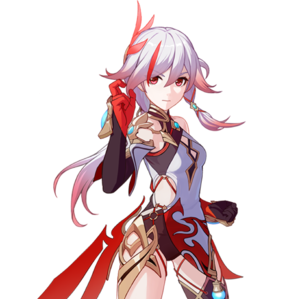
Is this just a coincidence, or does it really hold some deeper meaning? Personally speaking, I’d prefer that Kazuha stays human, but I guess another god isn’t too bad either :X
and with that design significance, my dreams of obtaining Kazuha as a 4* are flushed down the drain
#genshin impact#genshin impact theory#genshin theory#inazuma#genshin baal#genshin kazuha#kazuha#tohama#genshin razor#I accidentally brushed a finger past Post on mobile while it was unfinished#so I had to delete and rewrite this all over again from memory urkjrerjehrejhfyslfir
228 notes
·
View notes
Text
I have very mixed feelings on that aot ending
Ok so the politics of Attack on Titan have been discussed by a lot of people, some of whom have a very surface- level understanding of the story. I would like to start by giving my disclaimer that Attack on Tiatan ABSOLUTELY isn’t fascist, its anti racism, anti bigotry and anti discrimination themes are extremely apparent in it’s examination of the Eldians inside Marley, and fascist views held by characters such as Gabi are explicitly condemned in the text and made clear to be misguided and false.
I would now like to draw everyone’s attention to the openings of seasons 1 and 2.
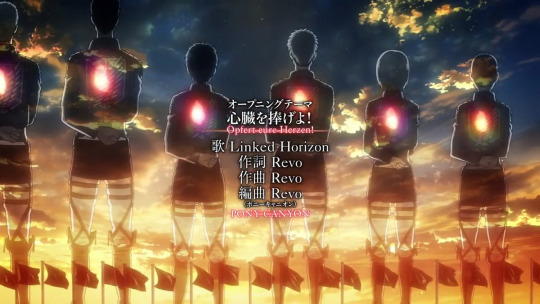
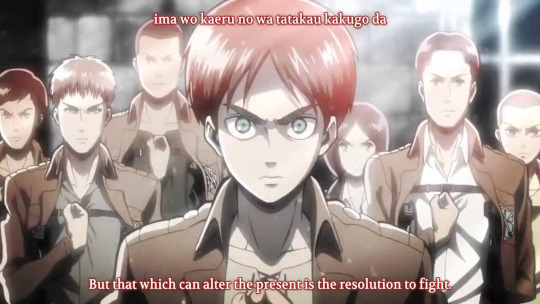
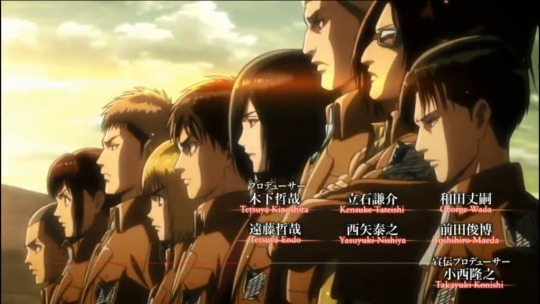
Images like these combined with lyrics like these:
You pigs who sneer at our will to step over corpses and march onwards Enjoy the peace of livestock false prosperity "freedom" of the dying wolves that hunger
We dedicate and sacrifice our hearts
And also the use of german lyrics:
Sie sind das Essen und Wir sind die Jaeger! (they are the food and we are the hunters)
O, mein Freund! Jetzt hier ist ein Sieg. Dies ist der erste Glorie. O, mein Freund! Feiern wir diesen Sieg, für den nächsten Kampf!
(O, my friend! Now, here is a victory. This is the first glory. O, my friend! Let us celebrate this victory for the next battle!)
This is the stuff that lead me to believe that this is a deliberate use of fascist imagery. If the show just wanted to go for a militaristic vibe for the aesthetic of it, references this explicit to fascist propaganda and the use of German lyrics was not necessary. Also, lines like this:
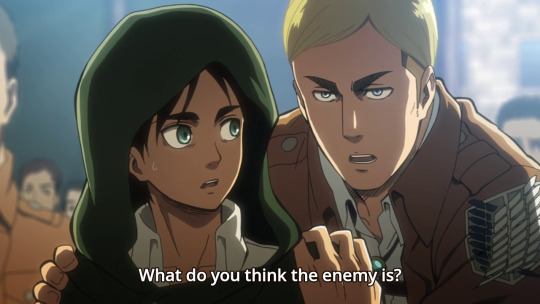
And plenty of evidence that things were not what they seemed it the world of aot and that the overly simplistic view of good vs evil (humans vs the titans) was incorrect led me to believe that Attack on Titan was a deliberate deconstruction. That it was putting the audience into the mindset of the fascists to pull the rug from under their feet later. And I was right. Sort of.
As the story progresses, the world becomes a more and more complex political landscape and we are led to believe that this black and white mentality is wrong. We are also informed that the people who can transform into titans, the Eldians, are an opressed minority, explicitly paralleled to the Jews during nazi Germany, from their living in internment camps, to them being called devils, to their armbands, to a large number of them (our heroes) being confined in an island with walls circling them, which is revealed by Isayama to be Madagascar. The island that the nazis originally meant to confine the Jewish population in before arriving at the conclusion that that would be too costly, and that genocide was preferable.
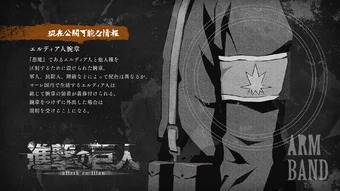
This is the first of the story’s mixed metaphors. While the show’s heart is in the right place, being sympathetic to the Eldians and showing their plight under marleyan opression and persecution, there is one problem. The reason for the opression of the Eldians is because the world is afraid of their power, as they are a race with the ability to transform into titans. There is, therefore, a tangible, justification for their internment. The Jews were not in any conceivable way a danger to anyone, they were simply scapegoated for the complex socioeconomic problems of Germany in the time period. Also, if we take a look at those openings again, we observe that the Eldians (our main characters) who wish to free themselves from their shackles are framed as fascists. So... what is that saying?
The idea, as I see it, is that the story is condemning fanaticism in general, as a biproduct of a militaristic black and white worldview. The monstrous titans that our (framed as fascist) heroes fight against are revealed to be human, just like them.
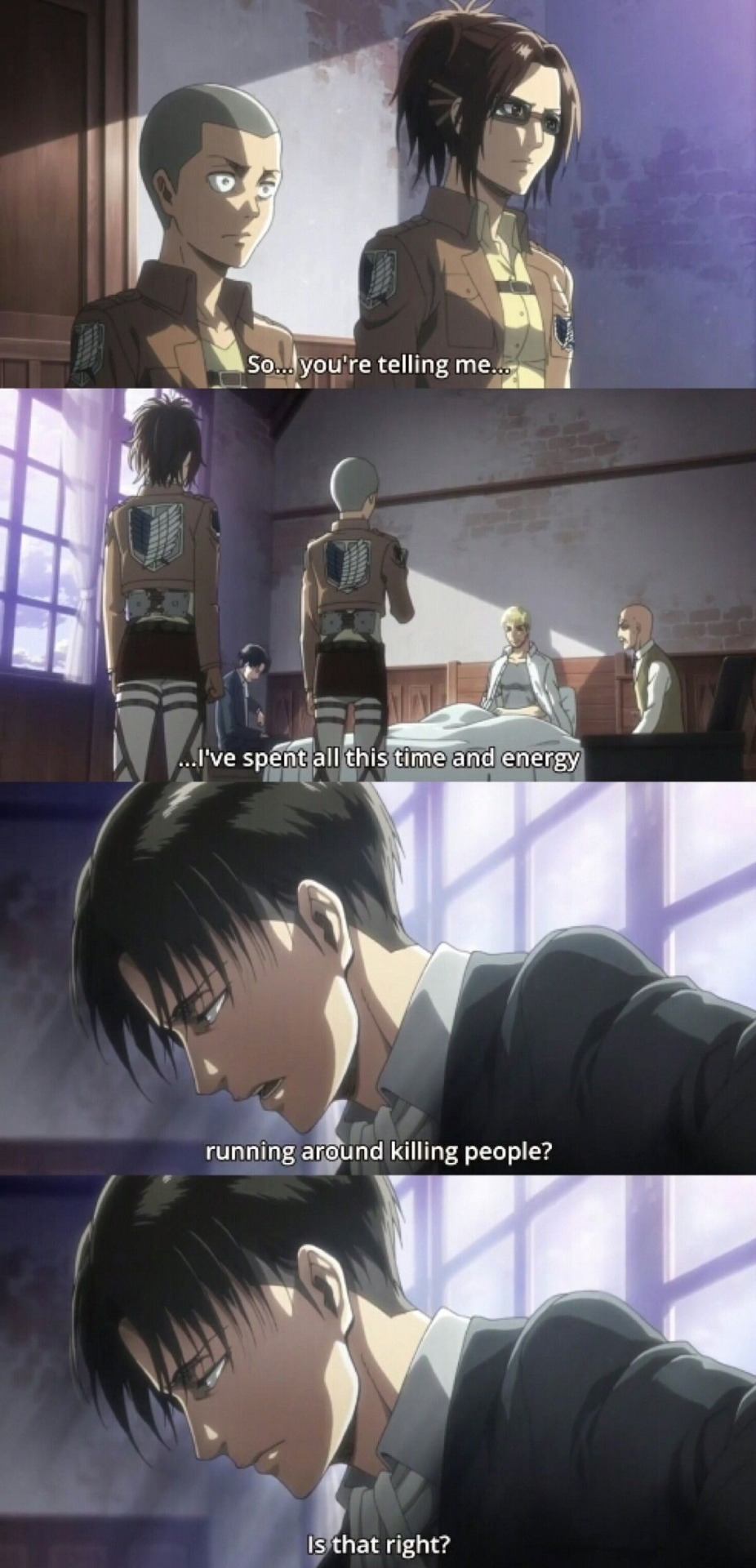
The same is the case for the Eldian “devils” that the Marleyans fight against. Gabi, the character who is most fanatically against Eldians (despite being an Eldian herself) is comfronted with the humanity of the people she hates once she gets to know them.
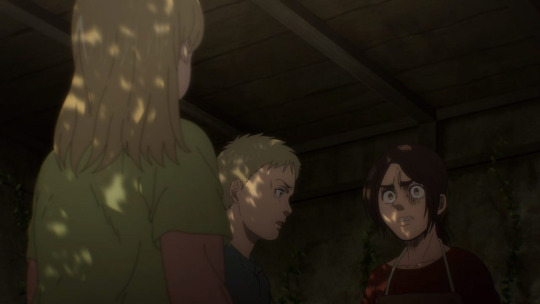
Again, Isayama’s heart is on the right place here, trying to condemn bigotry, however the explicit referencing of history is the imagery is kind of misplaced, for the reasons I previously mentioned. Now let’s have a look at Eren Yeager.
Eren starts the story as a kind of messed up kid. He kills the human traffickers who kidnapped Mikasa while screaming:

I mean, in this case he is certainly justified, but his rage and anger are definitely not normal for a child his age.
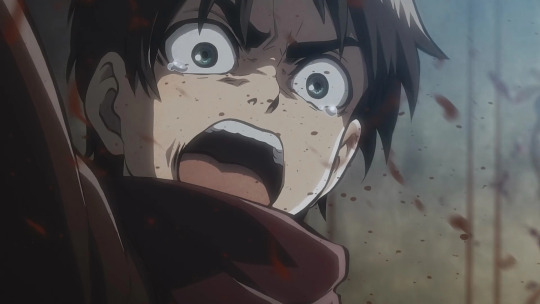
This is Eren. He can’t stand injustice when he sees it. And injustice is what happens to him when the titans attack. His already fiery attitude and mindset is what leads him to this declaration of revenge:
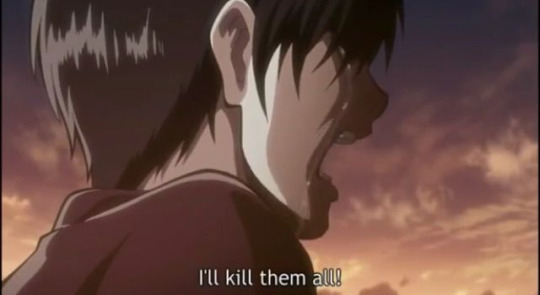
That side of Eren is visible throughout the story and it’s foreshadowing for what he will later become
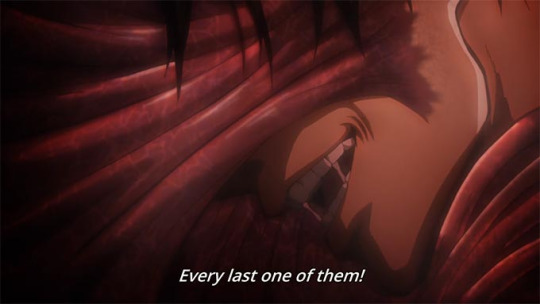
Eren, however, is a natural product of his environment. Ravaged by socioconomic inequality, with the rich living in the centre of the walls and the poor living in the outskirts, constantly under the threat of the titans and unable to obtain any kind of freedom, Eren’s philosophy of the need to be strong to overcome one’s enemies makes sense. The mantra “the strong prey on the weak”, that he ends up teaching Mikasa (another allusion to fascist ideology) is a biproduct of the world he lives in. He does not know of the political intricasies outside the walls. All he knows is he must kill the titans.
Eren’s titan is described as the “manifestation of humanity’s rage. It is huge and monstrous, and could be seen as a metaphor for vengeful hatred in general. Keep that in mind, it’s relevant for the ending.
This manufactured and false black and white worldview shapes him as a character, and it’s what eventually, after the arrival at the much desired ocean, leads him to this:
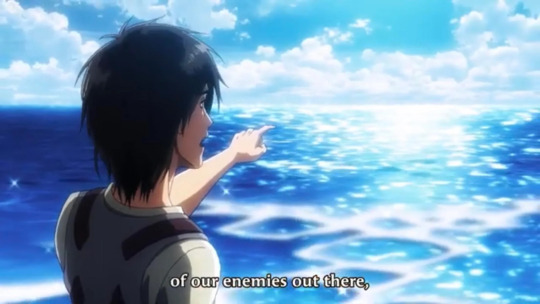
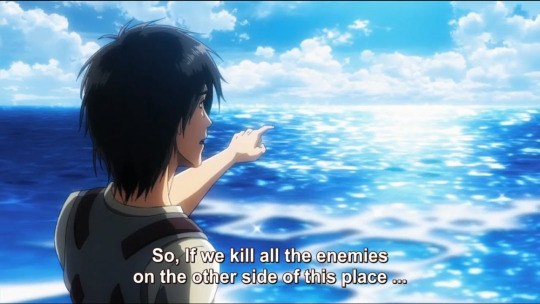
“Will we finally be free?”
In the continuation of the story, Eren falls toward the dark side more and more, to the point of committing atrocities and war crimes that are explicitly framed as being similar to what he suffered as a child (see his actions in Liberio). He even acknowledges that, telling Reiner, the person who committed said war crimes against him, that he essentially has no hard feelings and understands that the two of them are similar, doing what “needs to be done”. The character of Gabi, who, after what happens in Liberio, becomes obsessed with revenge against the Eldian “devils” is meant to be a foil for Eren, and his obsession with killing the titans after what happened to him.
Extremely interesting is the way in which certain ideas and images are flipped in the later seasons. Namely, in season 4, we see a character who idolizes Mikasa and supports Eren’s plans in a scene where she spouts the same mantra of “the strong prey on the weak” and says that Mikasa saving her is what showed her that only with strength she can defeat her enemies. Mikasa tells her to shut up, and she proceeds to do the salute, that has been so glamorized by the show’s openings thus far. Now, it is done by a person from a military faction with a fanatic worldview. The direction doesn’t glamorize it at all. It is a nuanced, almost masterful deconstruction.
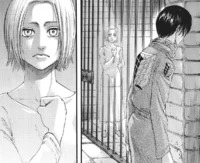
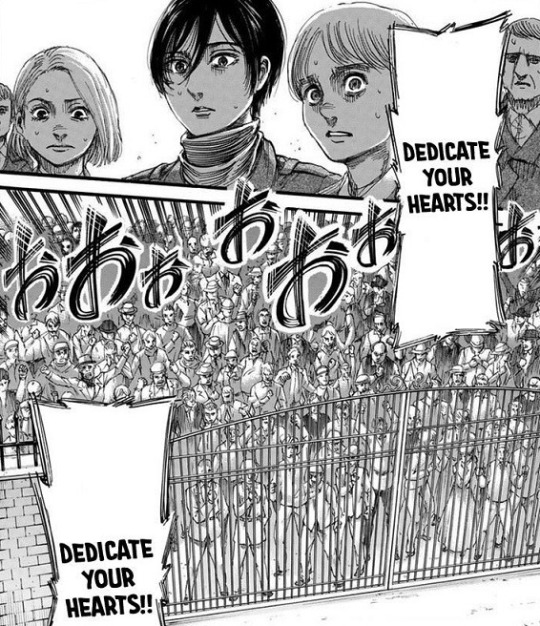
Levi, who has always looked for reasons for why his comrades had t die, justifying their heroism and convincing himself that their deaths were not pointless, ends up here:
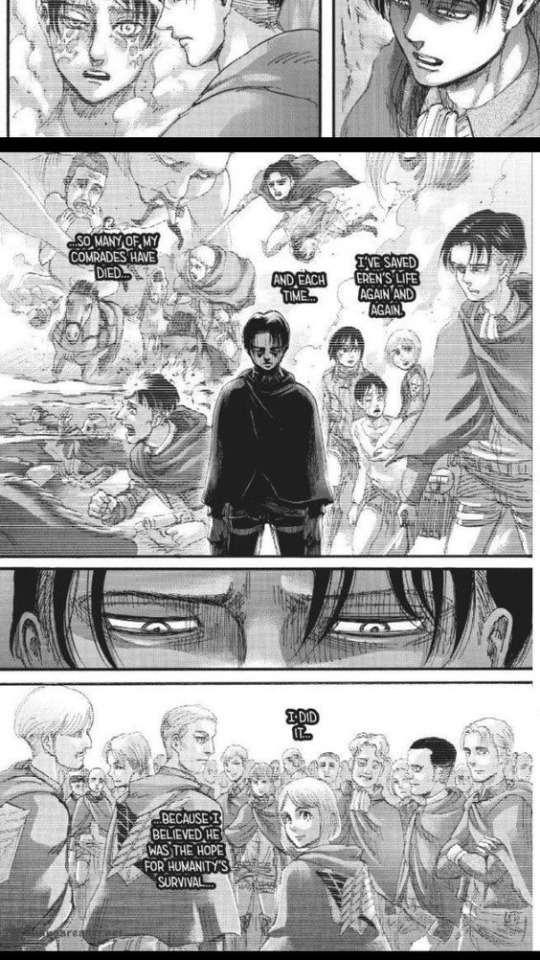
At this point, I was in love with Attack on Titan. From here, it only figures that Eren ends up attempting a genocide of the people outside the walls. He has essentally become what he hated the most, and he’s a natural result of the world that created him. Despite his noble intentions, he has turned into a monster. Mikasa, the prerson who loved him the most, completes her character arc by killing him, thus rejecting her blind devotion to him and being free, while at the same time continuing to love the person he once was. It’s a sad and tragic ending, painting Eren as a tragic character and making a pretty strong political point, despite having a few mixed metaphors.
And then, chapter 139 came out...
And Eren apparently pulled a Lelouch. This is a “I purposfully turned myself into a monster to save the world and make my friends into heroes for killing me” kind of thing. It is important to state that the manga makes it clear that Eren would have trampled the world even if they didn’t stop him, because of his urge to be free. However, that urge, that fighting spirit, end up being a good thing. The death of our heroes in battle apparently wasn’t pointless after all. They say goodbye with a salute
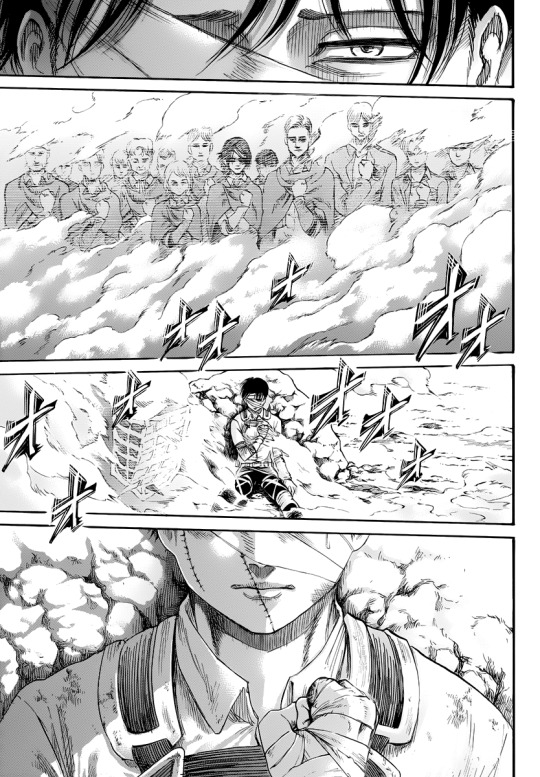
The Yeagerists, who were previously framed as fanatics, end up in charge of the government
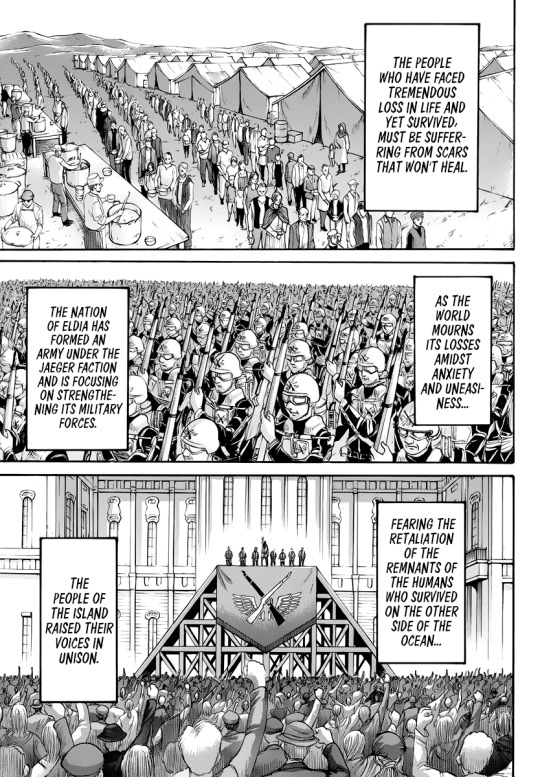
It is important to state that the real event, the catalyst of the ending, is that killing Eren, who has turned himself literally into the manifestation of humanity’s rage (which has now, through the intricacies of the story, taken the political meaning of hatred and intergenerational trauma), eliminates the power of the titans. The titans are no more. This, in of itself, is good, and in keeping with the spirit of the political commentary thus far. However, the war, is still not over, and Eren’s mantra ends up being correct
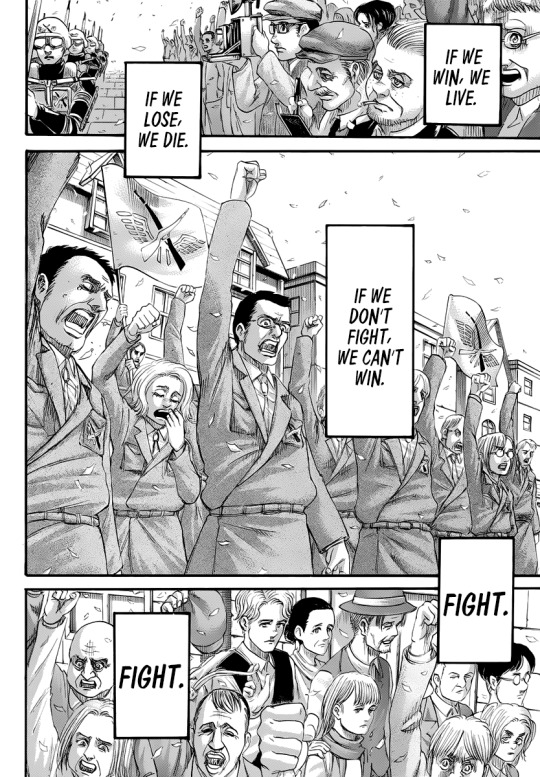

So the only way for the war to end is one of the races to be wiped out?
Also, despite Eren’s genocide being wrong, it is, in the end, justified, as a necessary evil by the story. An Ozymandias kind of moment in which the ends justify the means, but Eren himself has to die, because his crime was too great for him not to suffer punishment. Essentially, this chapter undoes all of the insightful commentary the story had made so far, by proving the ideology of its main character right. Story- wise this isn’t a bad ending, but if we take into account the political references the series has made, and its desire to explicitly tie itself with such imagery makes the ending leave a really bad taste in my mouth. What it essentally says, is that, yes, bigotry and racism are bad, yes, blind hatred is bad, but the general idea of might makes right and the impossibility of reconciliation are true. Armin, who has, throughuout the story, been Eren’s opposite, in terms of looking for peaceful solutions to conflict is rendered meaningless in the end, because him alongside with the other characters were all playing into Eren’s plans. The hearts of our main characters as recruits were in the right place, their fighting spirit admirable, and the overall worldview we are presented with in the beginning of the story remains more or less unchallenged.
So where does that leave this imagery?

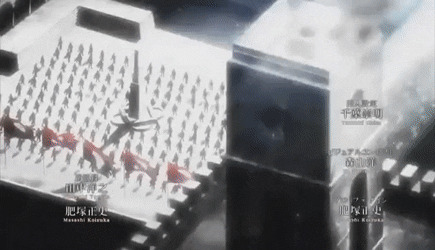
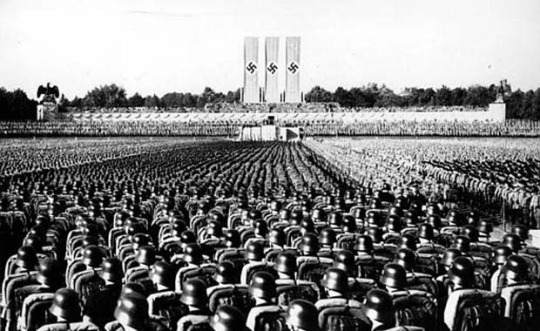
The conclusion is that one must think very carefully before including allegory in their work. I am not accusing Isayama for fascism, and I appreciate the efforts at deconstructing it throughout the story. However, in the end he did an oops I accidentally justified the mentality I was trying to condemn. I still like Attack on Titan, I believe it has artistic value and is overall a pretty good anime, I even agree with its politics to an extent. However, it is very important to critically examine the things we like, and see where they may have gone south. And this ending is that for me.
63 notes
·
View notes
Text
for once i WILL make a long analysis post no one asked for. p2 bad grief and his friendship with artemy below + p2 and classic changeling spoilers. let’s try to be serious about him for just a minute and forget about his giant pores and ugg boots i have no agenda i prommy
i know i’m not alone in thinking that bad grief’s relationship with his friends is one of the most interesting and telling aspects of his character in p2. for a liar, he’s extremely loyal. a lot of people have talked about how he comes through to protect rubin despite their differences, so it’s obvious how much he cares. lara also includes him in her confession, meaning she has reason to believe that he would try to give himself up to help her just as much as artemy and rubin, who it’s a lot easier to imagine doing something like that. he’s also a person constantly looking for acceptance, not by society, but by the people around him-- we learn this from his reflection, who also tells us how much artemy’s perception of him in particular matters to him.
unlike stakh and lara, he isn’t angry with artemy at any point in the story, even if artemy kills piecework, and doesn’t lash out at him even in the cathedral. he doesn’t seem particularly angry with stakh or lara either; what bothers him most is that they haven’t accepted him (“gravel-hearted lara won’t even look at me”). i think an important difference is that he’s watched stakh and lara grow up and grow away from him. the core of what distinguishes his relationship with artemy from his relationship with stakh and lara is very simply the difference between reuniting with a friend you haven’t seen in years due to them moving away or going to a different school or whatever vs a friend you’ve spent years growing apart from-- there’s no inherently saying that you’re more compatible with the separated friend (although yeah, there’s a lot to be said about artemy being the glue that held their group together), but you see them still as the person they were when they left, and there’s an instinct to jump right back in to the relationship as it was. since that’s the last you remember of them, that past is current in your memory, as opposed to being clouded by everything that came after the sort of halcyon days of youth. grief seems a lot more sentimentally attached to the gang’s past than stakh and lara. in part i think this is because he’s a childish person, but i think it’s also tied to that desire for acceptance.
when artemy shows up in grief’s nest, the first thing grief does is compare him to how he used to be-- specifically in a way that encourages denial. whether it’s an intentional choice or not, saying “you’re different now; you’ve gone soft” begs the answer “i haven’t gone soft”, with the implied “i’m not different”. similarly, through saying something along the lines of “could that be my old friend? no, you’ve changed,” grief ties artemy’s past identity to their friendship, such that engaging in their friendship is a return to youth. and there is a return to something; as much as artemy and grief trade half-insults, right from the beginning their conversations lack nearly all the tension and resentment in artemy’s early conversations with lara and stakh, and they have a good give-and-take in the way they talk to each other. there’s also a strong contrast here with artemy’s first conversation with lara, in which the first thing lara does is bring up how long he’s been gone, and stakh’s first words to him-- “why did you come? finally thought of some good excuses?” grief puts less emphasis on artemy’s absence than on hoping he’s come back, and less on how things have changed in the town than how things have changed with artemy. i’m talking a lot about it because it’s such a weird exchange, on the line between joking and heartfelt (”you’re no fun. aren’t you happy to see an old friend?” “oddly enough, i am”)
the other important thing that happens before-aglaya is their little railroad field trip. this is a weird moment. the plot itself doesn’t make a lot of logical sense as far as grief’s actions. artemy comes to grief asking to blow up the railroad tracks. grief doesn’t want to blow up the railroad tracks. grief agrees to blow up the railroad tracks, shows up to the railroad tracks, and tells artemy he’s not going to blow up the railroad tracks. and nothing really happens. the player can choose to just sit with him. if it’s a joke, it’s not very funny, and grief doesn’t seem like he’s in a joking mood. you’d kind of imagine he would just say no, or if he wants to send artemy on a wild goose chase he just wouldn’t show up. it’s not like there’s another dynamite supplier artemy would go to. for me, the explanation comes in what artemy says when he asks for the dynamite. the dialogue option that unlocks the event is “why not? let’s do it together. just like the good old days.”
aglaya is a force of maturation, a catalyst of coming-of-age. some of my friends were just talking about how in classic, she says she thinks the powers that be hated her because she wanted them to grow up. i don’t actually think this is a change with the force she represents in p2; she’s tied to a transformative stage of psychological development that deals with questioning authority and the established order of things. in p2 her power is most tangibly illustrated in her effect on bad grief.
when artemy asks, just like the good old days (and one of the ways he can ask for the dynamite is through reminiscing about their old games and saying he’s feeling sentimental), everything about grief draws him to help. he wants to help his friend, he wants to protect himself, he wants things to be like they used to. but in the shadow of inquisition, he’s starting to mature, and to realize that things can’t stay the same. he’s starting to embrace the future, and i think he wants to face that future head-on with artemy, who has basically re-accepted him, which is why he makes the plans and shows up. he can’t resist going, but he knows better than to bring the dynamite.
their relationship gets more complicated as grief moves into the cathedral. in the conversation that begins with “we need to escape, cub. escape.”, he tries to outline his new philosophy. unlike immortell, grief isn’t concerned with mortality, but with humanity, and he’s become convinced that the only way to become human is to leave-- but he doesn’t leave, because artemy doesn’t leave. he doesn’t say he needs to escape, he says they need to escape. there are two explanations i can think of for this, and i think the truth might be a combination of the two. it’s possible that on some level, he recognizes, like aglaya, that artemy is the only character with some kind of agency. the only way grief would be able to leave the town is through artemy’s agency, although in practice artemy’s agency is limited to make that impossible (no option to agree). still, artemy has what grief calls an “inner freedom”, which he both envies and admires. it’s all pretty similar to aglaya’s fascination with artemy, except more familiar. grief has always known this of artemy, he’s just starting to put it into perspective. it also seems possible to me that grief just doesn’t want to leave without artemy. he exists best in the context of others, as he deals in the web of connections between people; he isn’t one to strike out on his own. the only time we see him alone is at the signal fire by the railroad, waiting for artemy.
artemy has, gives, or represents everything grief wants and doesn’t get: acceptance, a return to youth, and freedom. in the nocturnal ending, grief outlines (if you get lucky i guess) one other thing artemy has that he doesn’t: “a good, honest face”. in the diurnal ending, artemy still struggles to understand what the fuck grief is talking about, but their relationship leaves off on a hopeful note that one day he will. idk i don’t know how to end this there’s just literally so much to think about here
87 notes
·
View notes
Text
Something that I like about Yona that’s really subtle is her ability to gain power through her actions.
As different as they are, one thing that I feel is subtly hinted in the manga is the parallels between soowon’s leadership abilities and Yona’s. How they are both able to bring people together and get things done. Soowon has always been portrayed as a dynamic person that can draw people in,and so has hak, but I think it can be argued that neither can touch the people finess that yona has. This girl has the golden touch in terms of gaining support.
When yona started this journey she had nothing but hak, and at one point was close to losing him too. She convinced hak to stay, she got the dragons to join her, she proved her worthiness to Gigan and helped her crew liberate awa, she gained the admiration of the fire tribe by bringing real tangible change to those who needed it, motivated Taejun to be a better person, proved herself to be a worthy friend and role model to Lili, and helped liberate the water tribe from drug trade. All things that she did by motivating others to offer their crucial support and even doing the work herself.
Because of her hard work, her determination, her resolve, and her actions, yona and her group have been able to become a national threats while being fugitives. Without these traits her story would be so short and way less successful. It is Yona’s ability to get people to see something in her, have them trust her, and make good on that trust that has given her the success that she has. And this gets often misinterpreted as her getting everything handed to her on a silver platter when it’s really not. Yona uses her strengths and her connections and strategic skill to make her wishes come to fruition.
That’s what irritates me about this arc so much. Even with everything she has been through and all the experience she has garnered, yona is treated like she’s still the same girl that got ran out of the castle. She’s not seen as someone who has had prolonged contact with people that other officials wouldn’t even look at (like the poor and dying in the fire tribe villages) or someone with experiences with other countries from her travels that can be used. Instead she is automatically assumed to be weak and unknowing and is all but told that her role is to sit still and look pretty.
And I’m sure this pissed yona off greatly. Firstly, she agreed to come back under the pretense that her group would be safe and that they would work in a form of allyship. Instead, she was parted from her loved ones, had their safety threatened, and essentially told to take back up that pretty doll role from before. Secondly, they really put her in a position where she had to go back to her place of trauma. The halls of Hiryuu Castle are stained with the blood of her father and just being there can’t be easy. I’m sure it feels like hell. And if I was forced to reside in the place where such an event happened all while being discredited and disrespected, I would raise hell. Fortunately yona is better than I am.
Yona is such a wonderful character who shows that power doesn’t only rest in what you can do alone. I love her so much and I hope that in the next chapters she can gain stable control of her situation and be happy again.
34 notes
·
View notes
Text
ok so here’s a post: Varian didn’t need to be in S2 but he needed to be in S3 more so that he could actually be a valuable part of Cassandra’s arc and Nothing Left To Lose could actually have a Point
The Point (or lack thereof) of Nothing Left To Lose
So Nothing Left To Lose is a great song, top tier, but it achieves basically nothing. It comes out of nowhere because up until this point, Varian doesn’t even seem to remember Cassandra exists, and after this point, Cassandra never reflects on what Varian had to tell her.
The song itself is a conversation in which neither of them are listening to each other; Varian is telling Cassandra that she’s going down the wrong path without listening to her, and Cassandra is telling Varian that she’s a #girlboss who’s cutting herself out of a toxic friendship without listening to him. Varian understands what she’s going through but he fails to reach her because Cassandra doesn’t want to be told what she’s doing wrong, she wants somebody to listen to her side of the story and validate her feelings. (For the record, this is why Zhan Tiri hooks her as easily as she does, because she’s the only one doing this.)
It feels very monumental but it doesn’t achieve anything and I think this is the key issue of NLTL- it’s the essential, cornerstone piece of an arc that doesn’t exist. It’s like they decided that because they had the key piece to a puzzle that they didn’t need to build the rest of the puzzle.
What needs to go before Cassandra’s Revenge
What’s notable is that Varian is the one person who should be the most sympathetic to Cassandra in this early stage of her own Villain Arc by dint of being in recovery from his own, but we never see him express any concern for her. The last time he saw her he was threatening her in his automaton, and then Rapuznel and co arrive back to Corona without Cassandra and we don’t get his reaction to this. At all. The way he responds to her in the beginning of CR is as if he’s never met her before, not as someone he personally knows and/or cares about.
It’s honestly a disservice to his character. He can understand how anger can cause you to spiral and lash out, and how wallowing in that anger can feel good- and he knows that Cassandra probably has a different perspective about what happened on the S2 journey than what Rapunzel has to tell him. Prior to CR, we should have not only seen Varian express concern for Cassandra, but decide that if he sees her he wants to reach out to her. NLTL is his game plan: Cassandra doesn’t want to listen to Rapunzel, but he won’t judge her for the things she’s done so maybe she’ll listen to him.
(Spoilers; NLTL goes exactly as it does in canon, because they both tremendously fail to communicate and oops Zhan Tiri is loose).
What needs to go after Cassandra’s Revenge
Ok so I don’t think it’s revolutionary to say I think Cassandra should have had more opportunity for introspection in the latter half of her arc, and should have had more time to reflect on her actions and come to regret them before she lost the moonstone. I like Once A Handmaiden in how it pushes her in that direction before everything turns to shit, but it’s pretty glaring that the events of NLTL had pretty much no impact on that.
In general I think Cass’ arc would have been more wholistic if Rapuznel didn’t have to be the only person involved in it, and I know I’m not the first to say that but the point I’m trying to make is that Varian easily could have been more involved in it and I think it sucks that he wasn’t. I think it would have been more impactful if, as Cassandra began to question herself upon learning ZT’s identity, Varian’s words in NLTL actually resonated with her. What resonates perhaps most of all is that he still cares about her, and that he understands what he’s going through and won’t judge her for it.
Which makes the fact that he’s the one to shoot her with the amber / devise the weapon (which I think is another disservice to his character because half a season ago he was having a crisis over using the amber at all and now he’s happily weaponising it but a different post for a different day) all the more hurtful for Cassandra- the last time she saw him he was telling her that he understood what she was going through and now he’s attacking her. It’s all a bad ZT fuelled misunderstanding but it’s top tier emotional conflict.
Also for the conclusion to be in any way satisfying Varian and Cassandra also need to have some kind of exchange in the end. While I think Rapunzel and Cassandra’s heart to heart needs to be a thing that happens between them exclusively, I think that Varian trying to reach out to her as well is ultimately more meaningful than the Lost Realm B-plot, and the specifics of how that’d play out are still tumbling around in my brain but I don’t honestly think it’s hard to beat out the Finale’s B-plot to make something more relevant.
Anyway
To repeat all this but more concisely, the lack of any importance Varian had in S3 is far more tangible to me than him being gone in S2, because he should have played a bigger part in reaching out to Cassandra as the One Person who understands what she’s going through. NLTL as it stands in canon is functionally useless, but I don’t want to get rid of it, I want to build an arc around it that actually justifies its existence because what it represents could have been so good, if it actually existed.
#people have already heard me talk about this but i wanted to have it on my blog for posterity#varian in s3 be like 'im not empathising with you wait i am wait i'm not' and it's not great#he deserved to care about cass and cass can take on his advice knowing he cares about her!#its like if i made Alphecca Cassandra's foil villain but never talked about Cass' moonstone past#like wadda hell
49 notes
·
View notes
Text
Sincere and Dignified
“Eddie's twenty-first birthday + The entire Losers' Club + Las Vegas + Being in love with your best friend = Well, exactly what you'd expect.”
[read it on Ao3]
(or here)
Eddie’s birthday is in November. Which makes him the youngest member of the Losers’ Club. Which makes him the last Loser to turn twenty-one.
Which means they go all-out to celebrate, since it’s the first time they can all (legally) celebrate together. And because they’ve kind of forgone “proper” twenty-first birthday festivities for everyone else, so no one would ever feel left out. Finally, no one needs to be left out of it.
They’ve all been living together for over three years now, they’re all getting close to graduating from college, and they all saved up for this one, because this is pretty much it. The last big, fun, tangible milestone in their young lives. The last “new” thing they’re earning the right to do (legally) after driving and voting. You bet your ass they go ham on Eddie’s birthday plans.
That’s how they end up in Vegas. Several long weeks of planning, lots of money they scraped together into jars over the last few years ready to be spent, checking and double-checking every class syllabus to make sure no one misses anything important on Friday (they have to be at their hotel in time for check-in or, between Stan and Eddie, someone will pitch a fit). Then they’re all piling into Ben’s station wagon with as little luggage as they could manage to bring for a weekend trip (the station wagon is “spacious”; it is not a fucking miracle vehicle).
Roughly ten hours later (five hours for driving, two for check-in plus cramming all their crap into the motel room and then attempting to organize it, one for figuring out and agreeing on where to even start with the partying, two more for getting ready) Eddie Kaspbrak has his first legal drink as a proper twenty-one year old, on this night of November third, and there’s no aftertaste of guilt like usual. He’s got Richie pushing shots into his hands, Mike making sure he’s eating some snacks once in a while so he doesn’t get too trashed too fast, Bev directing bartenders to make the most delicious fucking drinks he thinks he’ll ever taste in his life (Porn Stars, or something else inappropriate like that).
He has Bill, the oldest, practically under oath to stay sober (at least for tonight) so there’s one semi-coherent Loser present to keep the rest of them safe and sane until he can drag them all back to the motel.
He has a wad of cash in his pocket, a chunk of his savings from the past year, ready to blow on booze and gambling and whatever the fuck he wants, because it’s his birthday, so he’s allowed to do whatever the fuck he wants.
It’s safe, and more importantly, it’s legal, and most importantly, it’s Vegas. He never thought he’d ever have the balls to set foot in a place like this -- the kind of place his mother would demonize when he was a kid. Drinking, before he left Derry and his mom and the vice grip she had on his life, was completely out of the question, let alone getting hammered in a casino in Sin City, of all fucking places, under the care of the “evil little shits” he calls his best friends.
He more than lets loose. He lets twenty-one years of virtually non-stop anxiety unwind in one night.
When he wakes up the next morning, hung over for the first time in his life, it’s almost worth it. Bill’s the only motherfucker awake already, being that he’s the only one who doesn’t have several bottles of vodka et al. to sleep off, and he’s draped across the ratty arm chair in their ratty motel room, channel-surfing with the television volume as low as it can get. The light burns Eddie’s eyes, still, when he lifts his head and -- instead of turning, his head just kind of lolls on his shoulders until he can look at Bill properly.
He wants to ask him to end his suffering, which he can only assume he has yet to see the worst of. Suddenly he understands why aspirin exists. He wants Bill to pump him full of painkillers until he stops feeling like he’s made of electrified cotton. Instead, he says, articulately, “Guh.”
Bill turns his attention from Scooby-Doo to where Eddie is half-lying, trapped under the weight of Richie’s arm and half his chest. Richie is snoring away, glasses askew on his face, a cooling puddle of drool soaking Eddie’s shoulder. It’s gross, but he can’t really complain at this point. He’s accustomed to it by now.
“Ah, he lives.”
“Ugh,” says Eddie.
“I bet,” says Bill. “So, do you want a recap of the events of last night, or did you keep your promise and remember every life-altering decision you chose to make?”
Bill’s voice, which he’s hardly putting much effort into keeping down -- owing to the fact that all his effort is being channeled into trying not to laugh, and Eddie can’t even begin to fathom what’s so funny -- is causing the other Losers to stir. His splitting headache doesn’t want him to try to figure out what’s funny. He must have fried a metric shitload of braincells with all those Porn Stars last night, or whatever the fuck sugary booze Bev was pouring down his throat before everything went hazy.
“Life-altering?” he repeats after a few moments, as Richie’s arm finally stops crushing him. It’s the only word that really stands out to him in the jumbled mess of hangover discomfort his brain is fighting, and it should cause him anxiety but he’s more worried, right now, about drinking some water. Richie sits up beside him, yawning.
Bill hums. He looks terribly pleased with himself, which can be good or bad depending which side of the story you’re on, and Eddie’s got this sneaking suspicion he’s on the wrong side, here. “Yeah, that life-altering thing I tried to talk you two dipshits out of for longer than the actual ceremony took?”
“Ceremony?” Eddie asks, trying to feel back through his poor, poor brain to remember anything after slot machines and vibrant chatter and deceptively sweet beverages being passed to him. Richie’s head drops onto his shoulder as his arms wrap around Eddie’s waist. “Guh,” he says into the fabric of Eddie’s rumpled shirt. Habitually, Eddie reaches up to pat him consolingly on the head. Richie’s not one for mornings.
“Why don’t you take a look at your ring finger, birthday boy?” Bill says, but Eddie’s already frozen, because there was a flash when he raised his hand and he’s not entirely sure he’s believing what he’s seeing, and where the fuck did he even get the ring anyway, let alone a ring as nice as this? “Or, sorry, I should say: Mr. Tozier?”
Eddie... mostly ignores him, in favour of smacking Richie a few times on the skull to get his attention, hangovers be damned. “Richie,” he hisses, heart going a mile a minute. “The fuck did I do?”
Richie grumbles some kind of complaint, lifting his head from its safe space on Eddie’s shoulder, and when he follows Eddie’s gaze he lets out a kind of... laugh? More of a squawk, really. His left arm jerks off of Eddie’s waist lightning-quick, and then he’s holding up his own hand beside Eddie’s to show off their matching rings. “Oh my god,” he says, quiet (for Richie). A little bit of tension melts out of him. Then, “I think you mean, ‘the fuck did we do?’”
“Oh my god,” Eddie squeaks, and Bill loses his battle and dissolves into peals of laughter, remote slipping out of his hands and landing somewhere on the floor. “Bill, you were supposed to be babysitting.”
It takes a while, but Bill manages to regain his composure long enough to say, “Well forgive me, but you were a man on a mission. I distinctly remember a lot of, ‘we’re practically dating anyway’ and ‘no time like the present’ and ‘Bill, if you don’t step the fuck off I’m gonna shove this ring so far up your nostril you’ll be sneezing gold until you’re ninety.’ What was I gonna do about it?”
“Oh my god,” Eddie says again, red-faced, mortified, heart still going-going-going. They aren’t dating, though, is the problem, and yeah, he’s always had this stupid little idea in his stupid little head that they might as well be, but he’s never asked, because he wasn’t sure if he should. Wasn’t sure if it was safe. Wasn’t sure if Richie wanted something proper or to just stay very, very close friends until the grave. They weren’t dating, and now they’re married, and ohJesusMaryandJoseph why did he let himself get so drunk last night?
He doesn’t expect Richie to be resentful or anything, but he’s also an anxious mess by default, and post-drunken-haze Eddie is a different, apparently less chill person than mid-drunken-haze Eddie, because he doesn’t remember having this freakout last night.
He doesn’t think that Richie will be pissed about it, necessarily, but he’s terrified that Richie’s going to want to... undo this, somehow.
He expects regret.
He doesn’t expect Richie to slide his hand against Eddie’s so that their rings clack together, letting out a soft little, “Aw,” as he does so, or to press his scratchy, stubbly face against Eddie’s cheek to plant a kiss there, or to say, just as quiet and soft as ever, “We’re married, Eds.”
“Is that okay?” Eddie asks, heart in his throat, wondering if he somehow forced Richie into this when he wasn’t in full control of his faculties.
�� “More than okay,” Richie says. “Is it okay with you?”
Eddie nods dumbly, staring at their rings again, wondering what the fuck possessed them to make such a rash, life-altering decision like this, yet understanding all too well that his love for Richie is too big to contain and it has to spill out in little doses like this, or it’ll probably kill him, or make him go crazy. “Yeah,” he says finally, nodding perhaps too fast. “Yeah, Richie, it’s more than okay.”
He turns in Richie’s arms to kiss him properly, apparently not for the first time, and just the action brings a couple snippets of last night’s escapades abruptly to the surface.
*
“$25 Weddings,” a pink neon sign outside a squat white chapel proclaims, “Sincere and Dignified.” And below that, in smaller, baby blue lettering: “Can provide: Flowers, Rings, Witnesses, Transportation, Attire...” The list goes on. It’s a wonder Eddie is coherent enough to read it, let alone comprehend it, but he’s rounding on Richie, whose arm he’s hanging off of, with the best fucking idea already leaping from his lips.
*
“Ffffffuck Kaspbrak,” Eddie slurs as a reluctant Bill helps him slip on a suit jacket, fiddling with the purple clip-on bowtie Richie threw over the divider at him. “Fuck Kaspbrak, right, Rich?”
“Right,” Richie says enthusiastically -- probably too enthusiastically -- from the other side of the thin wooden divider that separates their “changing rooms.”
“Fuck that name,” Eddie decides, nodding to himself. Bill takes the bowtie out of his hands with a sigh, and Eddie lifts his chin to let Bill fasten it to his shirt, grumbling all the while about how stupid they both are. “And fuck my mom.”
“Fuck your mom!” Richie shouts. There’s a beat of relative quiet, then, “Not, like, fuck your mom, obviously. Fuck... you, maybe?” And then Bev’s raucous laughter echoes through the whole room.
Eddie can’t help laughing with her, even though Bill’s insisting he stay still “so you can at least look semi-presentable for your pictures, c’mon, Eddie, this is a big moment for me, too.”
*
“How are you the bridezilla, here, Bill?”
“Could you please just work with me here, I swear to-- agh!” (More laughter from Bev. Stan saying something incomprehensible but loud and boisterous. Mike trying to shush them.) “I’m just trying to make sure this is actually special since you absolute buffoons refuse to just wait and do this right.” Is Bill fucking crying?
*
Richie’s tongue down Eddie’s throat, over and over and over: in the chapel; in a bar; in front of the bar; just before Bill drags them away from the casino they’re trying to sneak back into and instead towards the station wagon he’s doing his best to herd the Losers to; in the station wagon; in front of the motel.
Bill prying them apart with minimal assistance from a piss-drunk Ben who insists he’s “helping,” telling them once again that they are not allowed to consummate their fucking marriage in public, and especially not allowed to do it in the motel room all seven of them have to sleep in--
*
He hears Bev’s little “aww” behind him somewhere as he and Richie break apart, and Stan’s grief about how fucking early it is “for this shit.” Eddie can hear something like a smile in his voice, if not just plain old amusement.
“We’re married, Rich,” Eddie repeats incredulously, and Bill is saying something about their marriage license in his wallet because neither of them can be trusted, but Eddie couldn’t care less about licenses or whatever, because Richie’s smiling down at him in that way that makes his heart feel too full. And he doesn’t mean to, but a choked noise bubbles up out of him, almost a sob, maybe a laugh. Tears burn in his eyes.
But that’s alright, because Richie’s crying already, and he wraps himself bodily around Eddie, rolling them over so he’s squishing him into the mattress while he kisses all over his face and his throat until Eddie’s squealing with laughter despite his agonizing hangover. He almost feels too good to care about it now, but he’s definitely getting some water and painkillers into his system the second the weird high he’s feeling subsides.
“Okay, okay,” says Stan, standing above them suddenly, swatting at Richie’s shoulders. “You’ve had your fun. Noisy assholes. We were too drunk for proper congratulations last night. Move over.”
All the Losers squeeze themselves onto the queen bed, somehow, and water bottles and aspirin get passed around. At some point Bill gets up to start the coffeemaker and comes back with (good fucking lord) their “wedding photos” in a crisp manila envelope. They’re just as gaudy as he expected. Leave it to Richie to find the ugliest possible outfit for his literal wedding.
Eddie gets hugs and shoulder-squeezes and cheek-kisses from everyone, over and over, and Bev actually cries for about ten full minutes while she holds him, then at least ten more while she holds Richie, and then Ben cries, and... well, they all end up crying all over each other, but it’s awash with joy. “We’re happy for you,” they keep saying, and Eddie’s happy for them, too. He didn’t expect to accidentally do things this way, but he has to be glad it happened.
“God,” he says a while later, shaking his head as he sips sugary coffee from the mug he and Richie are sharing (this room is meant for four people, max, not seven, and is equipped accordingly). He’s still examining a picture of Richie attempting to give him a piggy-back ride out of the chapel. Bill is visible in the background, eyes red and puffy, a wad of tissues clenched in his hand while Mike tries to console him. Eddie has been making fun of him for about half an hour now. “My mom would flip if I told her about this.” But the thought doesn’t scare him. He doesn’t get scared of her anymore. Not like he used to. Not when he’s so far away and he feels so safe with these six idiots who bring so much joy to his life.
Richie’s thumb rubs over the skin of his lower back where his hand has crept up Eddie’s shirt. “Good thing you don’t have to,” he says, and that familiar mantra of “You never have to see her again,” bleeds through, plain as ever.
Eddie hums. Passes the coffee back to him. “I know. But... I kinda want to. Just to watch her head explode,” he says with a shrug and a grin, earning a chorus of easy laughter from his friends. He stares at the ring on Richie’s finger as Richie throws back the rest of their coffee, something warm and familiar blooming brighter in his chest.
#reddie#my writing#oh look i actually found time in the chaos of my life to post this#a miracle#also a fic short enough to just post the whole thing on tumblr???#a second miracle#the losers club#cw alcohol#cw gambling#vegas wedding babey
67 notes
·
View notes